| Transparent Public Procurement Rating– Assessing Public Procurement Legislation and the Enforcement Process in the Eurasian Region |
Open Society Institute Budapest Foundation |
2016-2017 |
$137,473 |

Name of Grant Activity: Transparent Public Procurement Rating– Assessing Public Procurement Legislation and the Enforcement Process in the Eurasian Region
Donor Organization: Open Society Institute Budapest Foundation (OSI)
Grant Recipient: Institute for Development of Freedom of Information
Total Grant Amount: 137, 473 USD
Project Number: OR2016-2819
Period of Performance: June 10, 2016 – June 9, 2017
Existing Situation
Traditionally, public procurement is considered to be one of the key areas susceptible of corruption, especially in the economies of developing countries with widespread corruption. Constituting 10-20% of GDP and 45% of government spending, public procurement can become a significant budgetary waste at taxpayers’ expense.
The importance of corruption free, effective and transparent institutions is highlighted in the 2030 Agenda for Sustainable Development as a part of the United Nation’s 16th Sustainable Development Goal. In addition to the London 2016 Anti-Corruption Summit Communique, where corruption is named as a top priority having global importance anti-corruption is also one of the main areas identified in the Open Government Partnership (OGP) commitments focusing on the efficiency of public contracting. In fact, the Open Government Guide lists four steps to achieve “fair and good value-for-money” public contracts , focusing on improving existing public procurement systems to make them more transparent and accountable.
Armenia, Azerbaijan, Belarus, Georgia, Moldova and Ukraine are the states, which became independent from the Soviet Union simultaneously, yet have had varied success in terms of fighting corruption within the same timeframe. The fact is illustrated by the significant differences in rankings of the Corruption Perception Index among the selected states. For instance, looking at the indexes of Georgia, Armenia, Moldova and Ukraine, there is almost a 100 ranking position difference between the best and the worst performing Eurasian states selected for the project out of the 176 countries examined in the report (Georgia -50th, Armenia -92nd, Moldova -103rd, and Ukraine - 142nd ).
Having diverse political and legislative regimes, the public procurement systems of the abovementioned states differ accordingly. One of the distinctive aspects is civic control over public procurement. Georgia has a transparent system of public procurement with effective mechanisms of public control over the public procurement Dispute Resolution Board, where the Council is composed of the representatives of civil society on the rotation basis. Similar civil control mechanisms are very weak or non-existent in other Eurasian states, where much of the effort is concentrated on reactive control, rather than on proactive prevention.
Unlike civic control mechanisms, the laws on freedom of information – crucial element for transparent public procurement system – is present in the constitution of all the Eurasian states . Yet, the systems of public procurement of the states in question vary, as they are based on three different international standards (EU Directives on Procurement, the UNCITRAL Model Law, and World Trade Organization’s General Procurement Agreement). However, despite the fact that these standards focus on different aspects of economic activities, they are all directed toward transparency, integrity and objectivity, with efforts to harmonize respective provisions.
In order to establish and develop common standards of transparency and civic participation in public procurement systems of the selected Eurasian states, regulations based on the universal principles, such as transparency, openness and civic engagement should exist. As of now, there is no universal model for a standardized legal framework of public procurement that could assess legislation and lay the ground for the reform and development of public procurement systems. IDFI aims to address this particular gap by developing a common standard for assessing the legislative framework of public procurement by focusing on Armenia, Azerbaijan, Belarus, Georgia, Moldova and Ukraine.
In addition to the lack of universal model for a standardized legal framework of public procurement legislation, there is no effective mechanism for tracking the PPL enforcement process in the pilot states. Despite some improvements of PPLs in Armenia, Azerbaijan, Belarus, Georgia, Moldova and Ukraine, there are significant problems with the enforcement of PPL provisions. To match the existing gaps between legislations and their implementation process, IDFI, with its partner experts will assess the PPL enforcement processes in the pilot states and will work out an effective monitoring mechanism to regularly assess the developments in PPL and its implementation practices in Armenia, Azerbaijan, Belarus, Georgia, Moldova and Ukraine.
Objective
The project aims to elaborate a common standard for assessing the legislative framework of public procurement in Armenia, Azerbaijan, Belarus, Georgia, Moldova and Ukraine, which will later be used to evaluate the PPL enforcement process in the pilot states.
Activities
- Elaborating Public Procurement Legislation Assessment Methodology
- Launching online platform - Public Procurement Legislation Rating (PPLR) of the Eurasian Region
- Assessing Public Procurement Legislation enforcement process
- Building a network of Open Public Procurement Advocates
- Conducting active advocacy campaigns to reach out to relevant stakeholders including public officials, businesses, media, civil society and communities

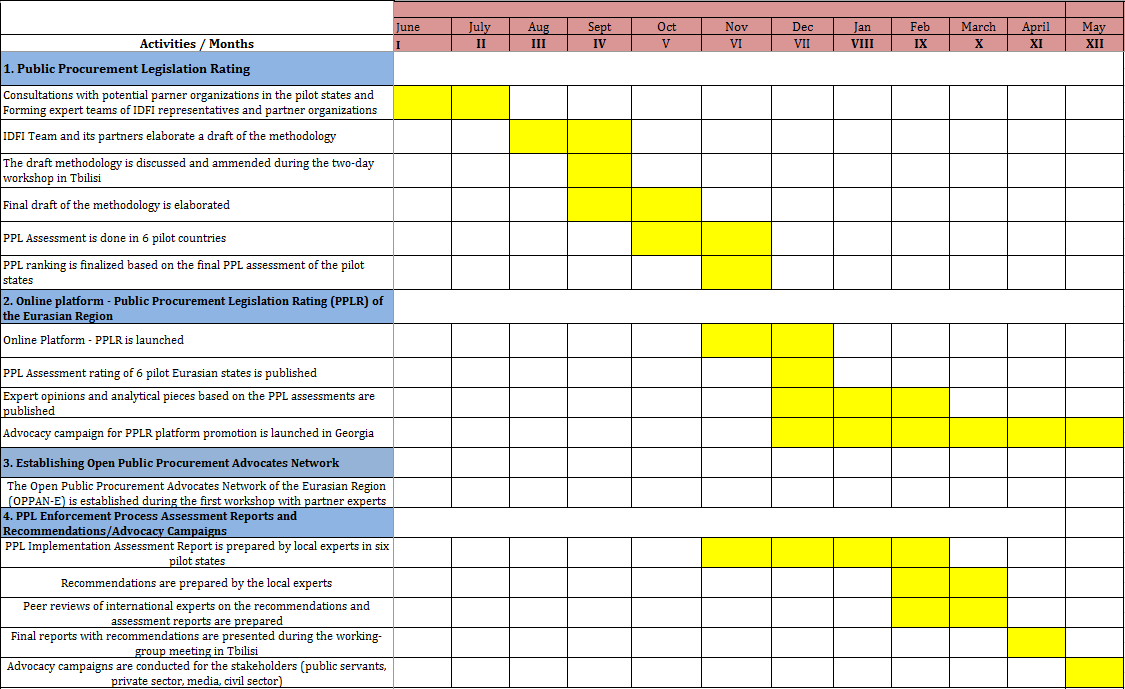
Grant agreement
|
Project aims to elaborate a common standard for assessing the legislative framework of public procurement in Armenia, Azerbaijan, Belarus, Georgia, Moldova and Ukraine, which will later be used to evaluate the PPL enforcement process in the pilot states.
View more →
|
| Developing a Transparency and Integrity Framework for the Ministry of Regional Development and Infrastructure of Georgia |
Tetra Tech ARD, USAID Good Governance Initiative |
2016 |
$52,351.52 |
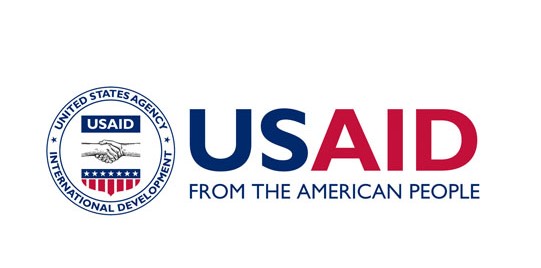
GOOD GOVERNANCE INITIATIVE (GGI) IN GEORGIA
Project Title:Developing a Transparency and Integrity Framework for the Ministry of Regional Development and Infrastructure of Georgia
Project Funding: Tetra Tech ARD, USAID/Good Governance Initiative in Georgia
Project Code: GGI-G-006
Total Budget: $ 52 351,52 (GEL 129,376.30)
Project Duration: March 9, 2016 – December 8, 2016
Project Description
Transparency, financial accountability, public engagement and access to public information are key principles that should be guiding every public institution. The Georgian public service system has seen a swift change from virtually absent public integrity to a system that guarantees a certain level of accountability of public institutions. Despite of a functioning institutional mechanism for the prevention of corruption, the progress still greatly depends on the individual effort of the institution and its management.
An effective and targeted effort to prevent corruption and increase accountability is based on several core areas:
• Transparency
• Effectiveness of the institutional framework
• Access to public information
• Evidence-based policy planning
• Fiscal accountability
• Public oversight
• E-governance
The Institute for Development of Freedom of Information (IDFI) aims to create an independent anti-corruption and transparency framework for the Ministry of Regional Development and infrastructure (MRDI) and incorporate the framework into the national anti-corruption system.
Goals of the Project
Main goals of the project are:
• To identify existing risks of corruption at MRDI through a comprehensive situation analysis.
• To create a working group tasked with the development of an internal anti-corruption policy document.
• Develop an Anti-Corruption and Integrity Strategic Document for the Ministry of Regional Development and Infrastructure
• Develop indicators that will guarantee successful monitoring of the achieved progress.
• Advocate for the formal adoption of the document and its incorporation into the general anti-corruption framework.
• Improve access to public information for further cultivation of public engagement.
Planned Activities within the Framework of the Project:
• Conduct individual interviews with major stakeholders at MRDI, its subordinate agencies and third parties, on corruption, existing procurement practices, procedures related to spending and implementation of infrastructural projects.
• Study internal audit reports and recommendations of the State Audit Office and monitor areas relevant for anti-corruption. Analyze international best practices with regard to corruption in infrastructural projects and large public spending.
• Carry out a detailed situation analysis on existing practices of transparency, accountability and access to public information in MRDI. Identify potential corruption risks, procedural flaws and the implementation of the current legal framework.
• Establish a working group composed of representatives from MRDI, its subordinate agencies and IDFI. The working group will be in charge of developing the MRDI anti-corruption strategy and its action plan for 2016-2017.
• Organize workshops and round table involving exerts of the field.
• Develop output and outcome indicators for the monitoring of implementation of the action plan.
• Develop the strategy and action plan on the prevention of corruption inside MRDI and its subordinate agencies. Following the adoption of the final document and the consultation with other Civil Society Organizations, IDFI will advocate for the adoption of the document as an internal regulation.
• Publication of the document and training of MRDI employees is another important phase of the project. It is vital that MRDI staff sees the document as a guideline for the prevention of corruption.
• Facilitating public engagement in the threats of corruption is another important phase of the project. Public interest can be mobilized through a transparent and effective system of disclosing public information. IDFI will issue individual recommendations on access to public information and proactive disclosure of public information, as well as advocate for a general improvement of the freedom of information environment through the adoption of the Freedom of Information Act.


/public/upload/IDFI_Photos_2017/anticorruption/final_report_mrdi_eng.pdf
Grant agreement
|
The aim of the project is to Develope a Transparency and Anti-Corruption Framework for the Ministry of Regional Development and Infrastructure of Georgia.
View more →
|
| Organizational Development Grant - IDFI |
Open Society Institute Budapest Foundation |
2015-2017 |
$113,850 |

Name of Grant Activity: Organizational Development Grant - IDFI
Donor Organization: Open Society Institute Budapest Foundation (OSI)
Grant Recipient: Institute for Development of Freedom of Information
Total Grant Amount: 113,850 USD
Project Number: OR2015-22682
Period of Performance: September 1, 2015 – August 31, 2017
Project Description
Over the years since its foundation, IDFI has gradually developed into a credible organization combining watchdog activities with in-depth research, and further advocacy in the field of open government in Georgia. Despite considerable success, however, IDFI is like many other CSOs as the vast majority of received funding is aimed at specific analytical output, leaving scarcely any resources for institutional development.
A grant from Think Tank Fund is crucial for further organizational and financial sustainability, which has become even more evident with the growing impact of IDFI. As there is no clear division of responsibilities, the Institute needs support to reorganize its internal structure, one of the goals of which will be to delegate part of responsibilities. In terms of quality of research, IDFI needs long-term thematic priorities for research products, standardization of various research outputs it produces, improvement of internal quality control mechanism, and establishment of external one. Besides, the limited resources hindered IDFI from comprehensive editing of its products. Development and applying of various research methods is another challenge for think tank direction of IDFI. Furthermore, IDFI needs more resources and knowledge for better communicating its findings with various target groups, such as more comprehensive communication strategy, assistance from web-developer and designer etc.
Goal of the project
The goal of the project is to assist the overall development of IDFI as a think tank in three specific areas: quality of research products, communications and advocacy, and internal development and governance.
Activities
- Quality of Policy Research and Methodology
- Creating thematic priorities, formats and methods for research
- Implementing internal and external review systems
- Contracting for editing and translation services
- Organizing distribution of research outputs
- Conducting trainings for IDFI team on research methods and research formats
- Subscribing to online libraries
- Communications and Outreach
- Elaborating long-term and short-term theories of change
- Elaborating communications strategy
- Preparing and presenting comprehensive analysis of policy impact of IDFI
- Sending a representative of IDFI to study visit in a foreign leading think tank organization
- Conducting training in communications for the staff of IDFI
- Hiring web-designer/developer
- Conducting media monitoring to evaluate policy impact of IDFI
- Internal Development and Governance
- Creating new governing structure comprised of a board of advisors, the board and executive director
- Creating thematic institutional directions reflecting hybrid character of the Institute
- Creating a position of Assistant to Executive Director
- Inviting Internal development expert for regular consultation and assistance
- Inviting fundraiser expert for regular consultation and assistance
- Creating a full-time position for PR and communications manager
- Organizing annual team-building meetings for the staff
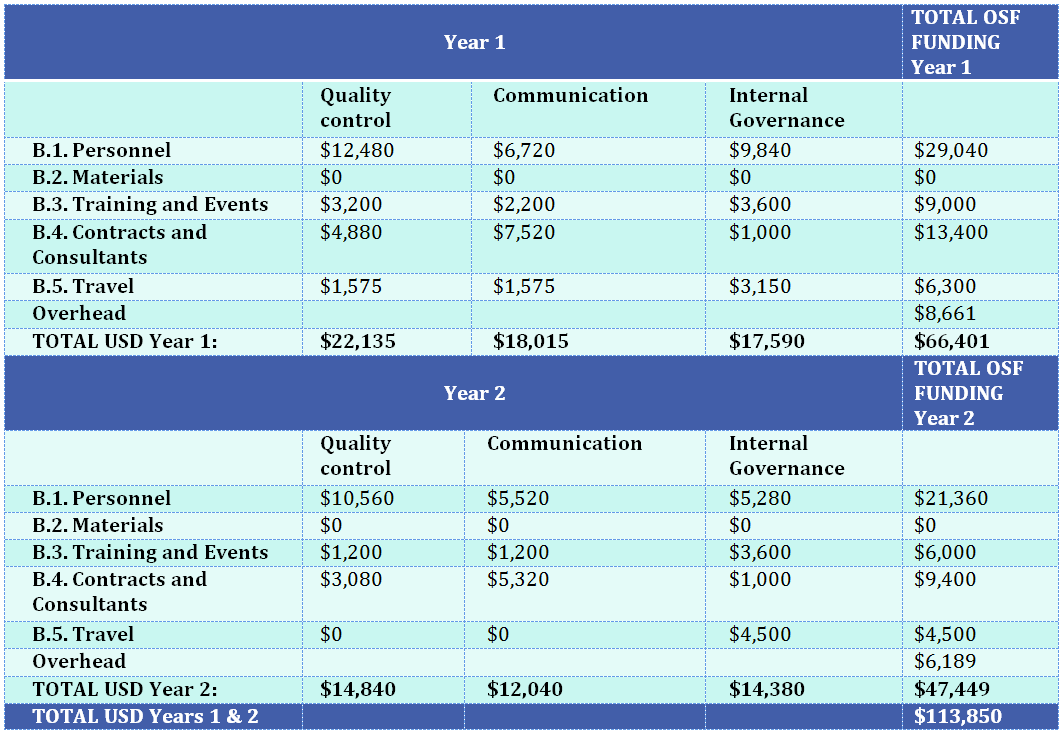
Grant agreement
|
The goal of the project is to assist the overall development of IDFI as a think tank in three specific areas: quality of research products, communications and advocacy, and internal development and governance.
View more →
|
| Supporting the Parliament of Georgia in Implementation of the Open Parliament Georgia Action Plan |
UNDP |
2015-2016 |
$45,335.70 |

Project Title: Strengthening the System of Parliamentary Democracy in Georgia
Donor Organization: United Nations Development Programme (UNDP) through the European Union funded program: “Strengthening the System of Parliamentary Democracy in Georgia”
Country: Georgia.
Partner organization: Parliament of Georgia
Grant Amount: USD 45,335.70
Period Performance: 28 DECEMBER 2015 - 28 APRIL 2016
In September 2011 Georgia joined Open Government Partnership (OGP) Initiative. OGP is a multilateral initiative that aims to secure concrete commitments from governments to promote transparency, empower citizens, fight corruption, and harness new technologies to make government more open, effective and accountable, leading to more efficient use of public resources, innovation and inclusive growth. It was launched by eight founding governments, including the United States and the United Kingdom. UNDP is an active supporter of the OGP globally, especially in the component of Legislative Openness.
Among 65 OGP member countries, at the onset of its membership, Georgia was scored among the highest (15 out of 16 maximum) on budget transparency, access to information and asset disclosure. As an OGP member state, Georgia dedicated itself to transparent and collaborative processes in public service, state procurement, public finances, and administration of justice, public participation and developing innovative technologies. Within almost three years Georgia managed to adopt and implement the first Action Plan (2012-13), participate in the OGP Steering Committee elections and adopt the second Action Plan (2014-15). In September 2014, Georgia was elected as an OGP Steering Committee Member for two years.
As the Government of Georgia had made progress in terms of engaging and fulfilling OGP commitments, UNDP, in the frames of its EU funded Project “Strengthening the System of Parliamentary Democracy in Georgia”, decided to support the Parliament in engaging in the similar process, through developing the legislative openness action plan. Since only a few parliaments worldwide were involved in the Initiative, such a decision was itself an innovative approach. To provide support to the Georgian Parliament, UNDP partnered with the Institute for Development of Freedom of Information (IDFI), the leading Georgian CSO engaged together with the Government in the OGP initiative at national level.
The process was launched in December 2014 and in less than a year, a remarkable progress was achieved. More particularly: on 12 February 2015, the Parliament officially announced its readiness to engage in the OGP and by the Order of the Speaker of the Parliament formed an Inter-Factional Group. Consisting of 11 Members of Parliament from majority and minority factions, the Group was tasked to develop the Open Parliament Georgia (OPG) Action Plan. To ensure close collaboration with the civil society, leading local and international organizations were invited to participate in the process through signing the Memorandum of Understanding with the Parliament on 30 April 2015. On the same day, the Parliament ratified the Declaration on Parliamentary Openness. After several rounds of meetings and workshops, the Inter-Factional Working Group and the Open Parliament Georgia Working Group (composed of local and international organizations) produced final draft of the OPG Action Plan, which was adopted by the Bureau of the Parliament on 17 July, 2015.
The main purpose of the Action Plan is to ensure the openness of the Parliament in accordance with the OGP principles and Declaration on Parliamentary Openness. The Action Plan, composed of 18 commitments, is setting up specific milestones to push parliamentary openness forward: (1) Public involvement, including for opportunities to comment on draft bills, present legislative proposals and attend plenary sessions; (2) Access to information, including for publishing draft bills in an editable format so that anyone can comment and adapting the Parliament’s web resources to the needs of people with disabilities; (3) Technology and innovation to make access to the published documents as easy as possible; (4) Accountability, including for establishing a permanent Parliamentary Council on Openness and Transparency and active cooperation with civil society.
Currently, 17 commitments from the OGP Action Plan remain to be implemented. The Parliament through its Permanent Council will be a responsible body and take ownership for the implementation of the Action Plan and coordination of the overall process. While implementation of the principles of Parliamentary Openness is a direct obligation of the Parliament, the Council, as a newly formed institution, will require external support to successfully accomplish the assigned tasks and responsibilities.
Overall Objective
Parliamentary openness and citizen engagement in the legislative activities of the Parliament of Georgia enhanced.
Specific Objectives
1. Facilitating the effective functioning of the Permanent Parliamentary Council on Open and Transparent Governance
2. Supporting the Parliament of Georgia in the implementation of the selected commitments under the Open Parliament Georgia Action Plan.
Expected End-Results
1. Permanent Parliamentary Council on Open and Transparent Governance functions effectively and is operational.
2. Concepts and/or draft projects of the selected five commitments under the Open Parliament Georgia Action Plan are elaborated and adopted by the Council.
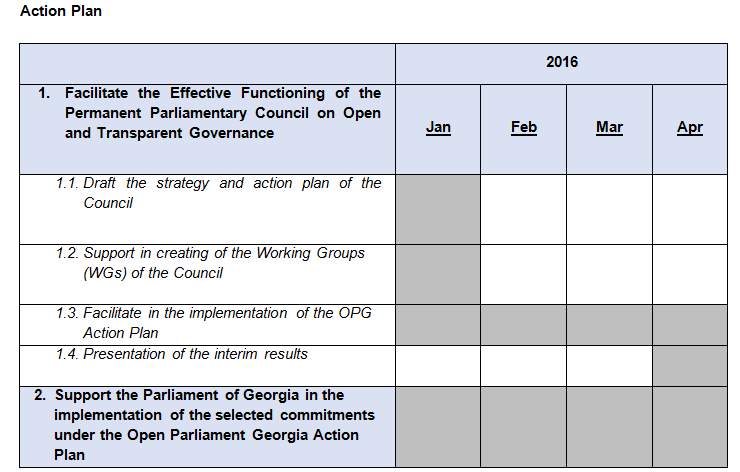
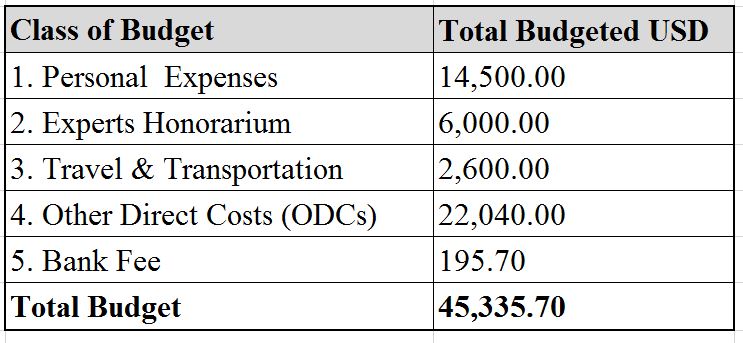
See the Project's Final Report:
/public/upload/Meri/Supporting the Parliament of Georgia Final Report (ENG).pdf
Grant agreement
|
Objective of the project is to strengthen parliamentary openness and citizen engagement in the legislative activities of the Parliament of Georgia.
View more →
|
| Improvement of Electronic Transparency in the Municipalities of Kakheti and Promotion of Public Engagement in the Work of Local Self-Governments |
Open Society Georgia Foundation |
2015-2016 |
$44,950 |
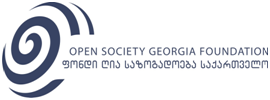
Project Title: Improvement of Electronic Transparency in the Municipalities of Kakheti and Promotion of Public Engagement in the Work of Local Self-Governments
Project Funding: Open Society Georgia Foundation (OSGF)
Project Code: LDD/14/15-20078
Total Budget: $ 44, 950
Project Duration: 16 October 2015 – 16 April 2016
Project Description
The goal of the project is to implement tools of electronic transparency in the municipalities of Kakheti region, increase access to public information and ensure public engagement in the work of local self-governments.
Goals of the Project
Main identified goals of the project:
- Create and improve the legal basis for proactive disclosure of public information in the municipalities of the Kakheti Region
- Elaborate and implementation electronic transparency modules
- Ensure public engagement in the municipalities of Kakheti
- Improve procedures for the proactive disclosure of public information
- Capacity building for individuals employed in administrative entities of the local self-governments
Project Activities
- Research the legal basis for proactive disclosure of public information in the municipalities of the Kakhet iregion
- Factual research on the status of electronic transparency
- Preparation of draft legislation and advocating for their adoption
- Preparation of electronic modules for the municipalities of the Kakheti region
- Conduct activities to raise public awareness


Grant agreement
|
The goal of the project is to implement tools of electronic transparency in the municipalities of Kakheti region, increase access to public information and ensure public engagement in the work of local self-governments.
View more →
|
| Promoting Internet Freedom in South Caucasus - Follow Up |
Embassy of the Kingdom of the Netherlands in Georgia and Armenia |
2015 |
€6,800 |
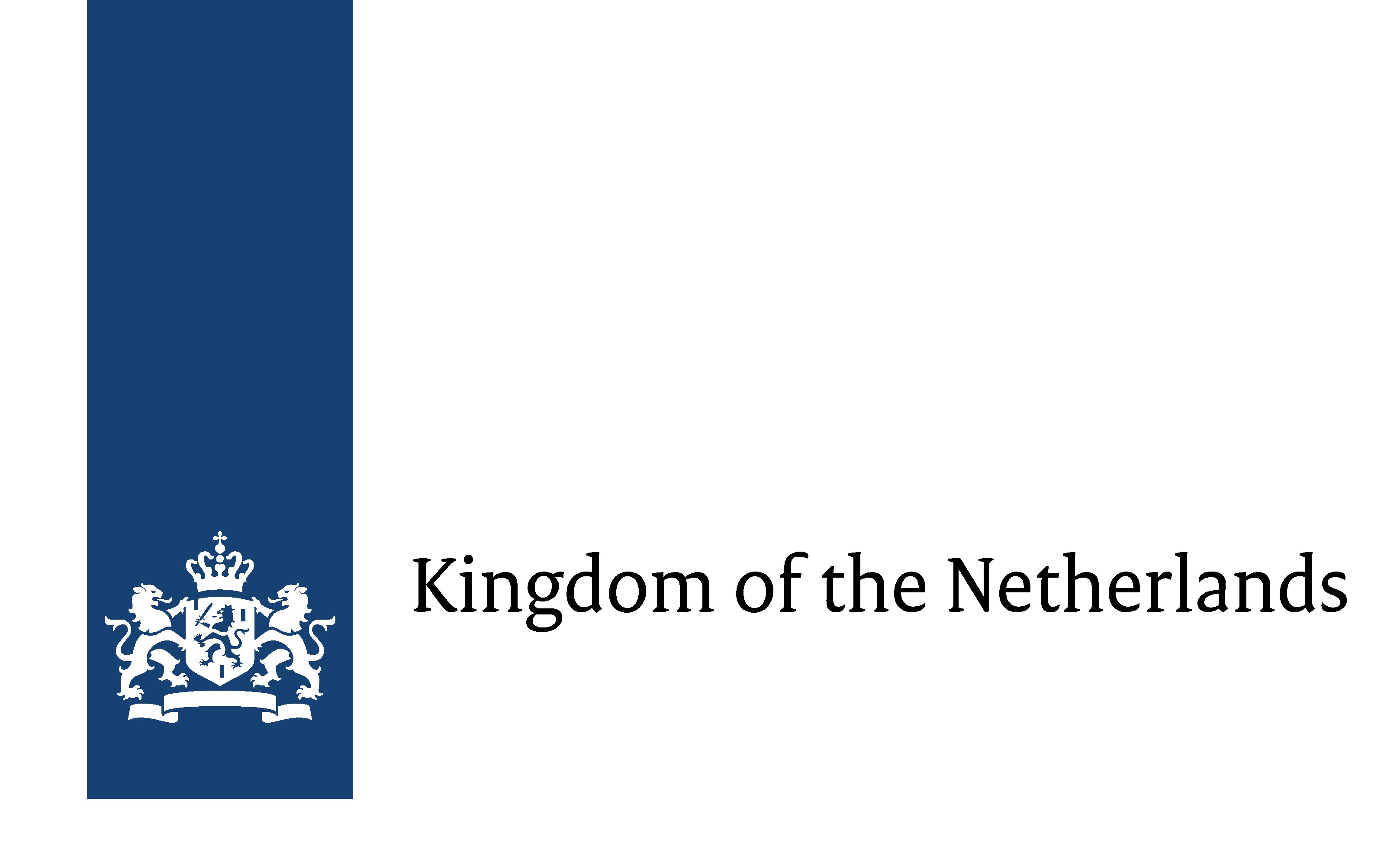 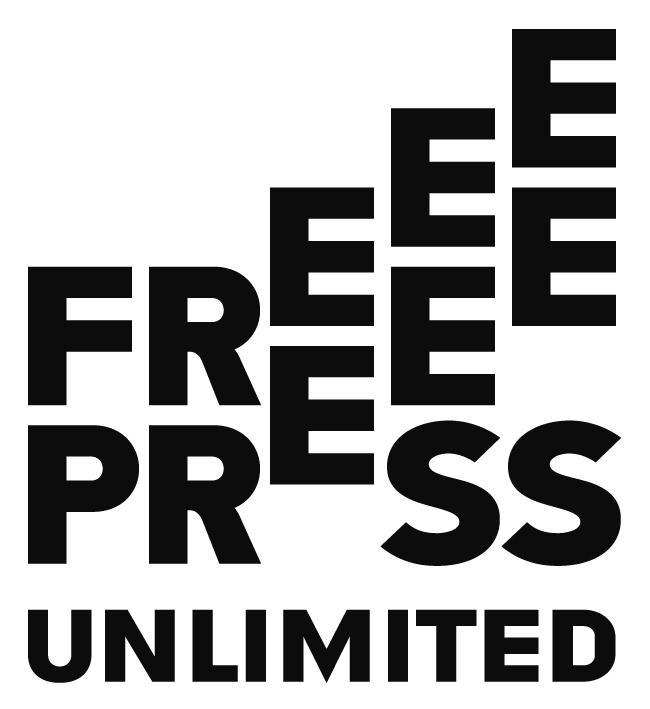 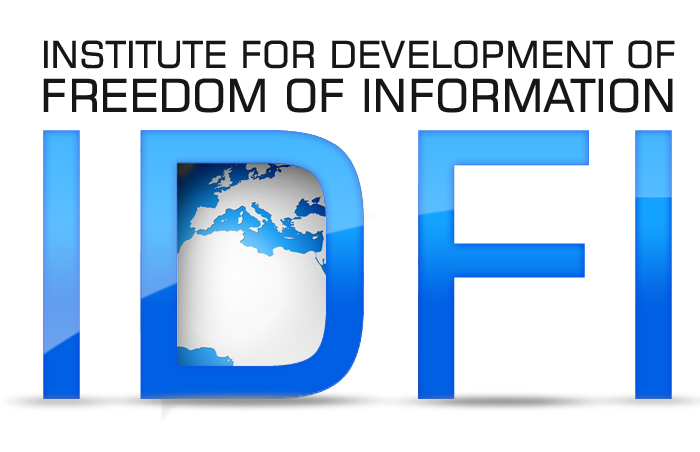 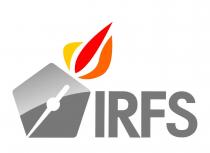 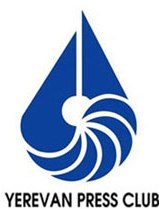
Project Title: Promoting Internet Freedom in South Caucasus - Follow up
Project Funded: Embassy of the Kingdom of the Netherlands in Georgia and Armenia
Project Budget: Total budget EUR 13.066 (IDFI budget – 6.800 EUR)
Project Duration: July 1, 2015 – November 30, 2015
Coordinator Organization: Stichting Free Press Unlimited
Partner Organizations: Institute for Reporters' Freedom and Safety (IRFS), Azerbaijan
Institute for Development of Freedom of Information (IDFI), Georgia
Yerevan Press Club (YPC), Armenia
Project Description: During the project period, distinguished media analysts, media lawyers, Internet activists, ICT experts from Georgia, Armenia and Azerbaijan will be working closely together in order to address the challenges of Internet freedom in the South Caucasus. This group of professionals will be associated with three prominent local organizations, namely the IRFS, IDFI and YPC.
Project Goal: The project aims to promote Internet freedom in the South Caucasus through research, monitoring, advocacy and training. It aims to expand and consolidate freedom of speech through establishing of a regional platform where democratic changes are stimulated and promoted through campaigns and story sharing.
Project Activities:
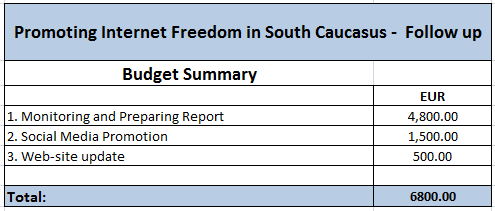
Note: This is a follow-up of a past project. You can see full information about the activities of the past project here.
Grant agreement
|
The project aims to promote Internet freedom in the South Caucasus through research, monitoring, advocacy and training. It aims to expand and consolidate freedom of speech through establishing of a regional platform where democratic changes are stimulated and promoted through campaigns and story sharing.
View more →
|
| Public-Private Dialogue (PPD) Quality Tracking in Georgia |
Governing for Growth (G4G) in Georgia / USAID |
2015-2018 |
$94,700 |
 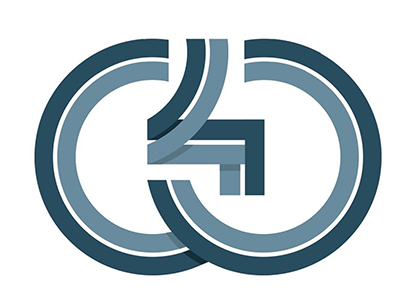
Project Name: Public-Private Dialogue (PPD) Quality Tracking in Georgia
Donor Organization: Deloitte Consulting LLP on behalf of the United States Agency for International Development (“USAID”) under Contract No. AID- 114-C-14-00007 for Governing for Growth (G4G) in Georgia
Project Number: RFA#2015 - 008
Grant Amount: 94,700.00 USD
Period of Performance: September 21, 2015 – September 21, 2018
Project Description
Collaboration between public and private actors is vital for economic development because an inclusive, participative, collaborative process leads to more effective policies and laws.
The newly-awarded USAID Governing for Growth (G4G) in Georgia project is designed to, among other things, facilitate a constructive dialogue between the public and private sectors by strengthening the capacity of both to effectively cooperate on policy and legislation. This includes building the capacity of government and private sector actors to utilize an evidence-based approach in policy-making and advocacy.
In accordance with the abovementioned principles, the Institute for Development of Freedom of Information (IDFI) will establish a regular, institutionalized platform for Public-Private Dialogue (PPD) intended to extend to future policy-making and development of legislation.
About Governing for Growth (G4G) Project
Governing for Growth (G4G) in Georgia is a five-year USAID funded Project implemented by Deloitte Consulting LLP since August 2014.
The purpose of the project is to support the Government of Georgia to create a better enabling environment in which legal and regulatory reforms are fairly and transparently conceived, implemented and enforced providing a level playing field for small and medium size enterprise growth.
G4G will strengthen capacity of both, public and private sectors, to effectively cooperate on identified reforms through an inclusive consultative process.
To achieve the goal, G4G will be supporting inclusive and constructive dialogue among government, private sector, and civil society stakeholders for the effective formulation of reforms to drive economic development nurtured through transparent and accountable oversight of the state.
G4G is comprised of five components: (1) Support inclusive public-private dialogue, (2) Strengthen the capacity of the GOG to develop, implement and enforce reforms, (3) Improve water resource management across multiple competing interests, (4) Improve economic governance and leadership of energy trading policy, including cross-border trading of electricity, and (5) Strengthen the capacity of private sector and civil society actors to advocate for reforms.
Goal
The objective of this grant is to develop and implement a “PPD Quality Tracking Mechanism” for which each major law or regulation proposed by selected key ministries will be evaluated upon the extent and quality of inclusive consultation and assigned a rating in terms of four PPD quality parameters:
- Policy Design and Development
- Legislation/Policy Drafting
- Regulatory Impact Assessment (RIA)
- Circulation and public comment
Activities
- Preparing PPD Quality Tracking System Design and Methodology
- Implementing PPD Quality Tracking System
- Periodic reports on evaluation of laws produced
- Public discussions
- Annual Reports and awards
- Trainings for civil servants
- Trainings for representatives of CSOs
- Outreach/Dissemination activities
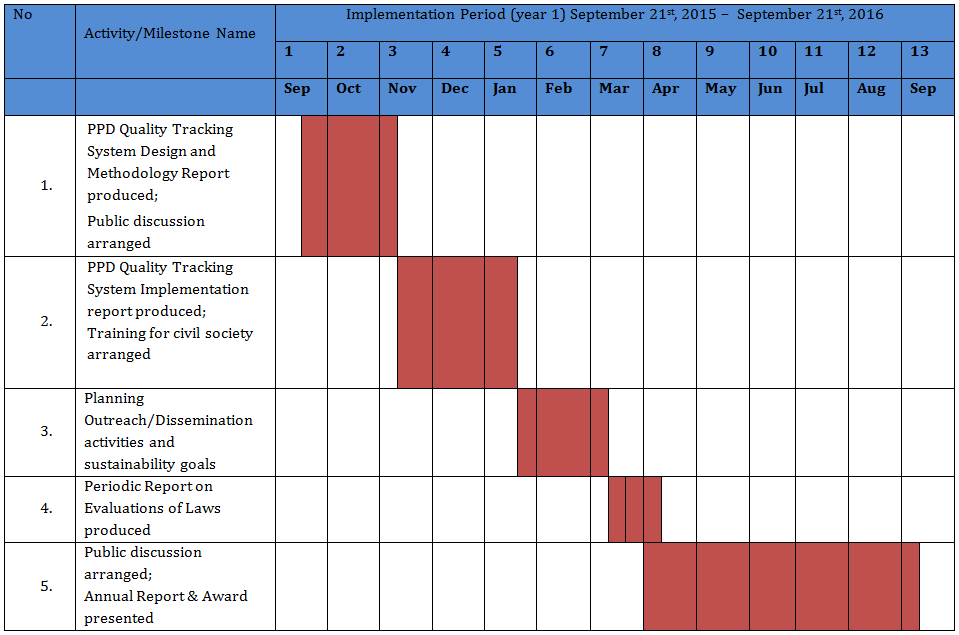
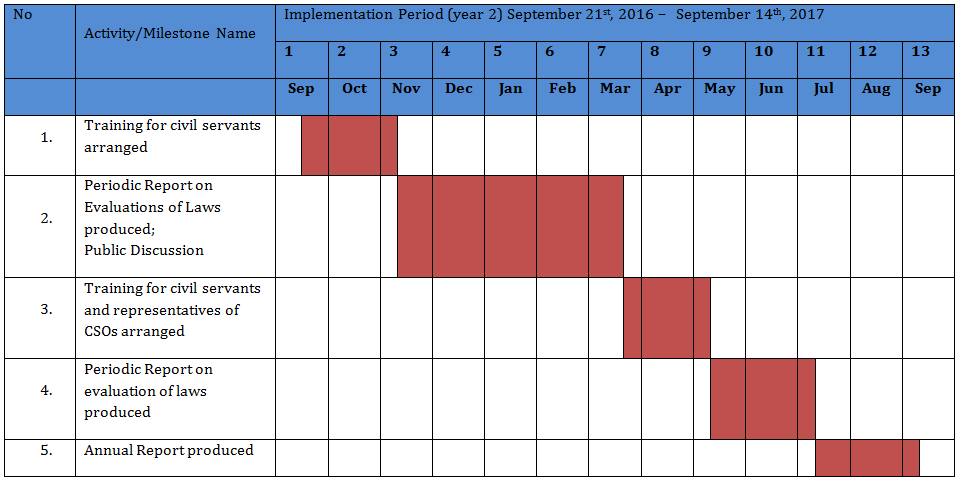
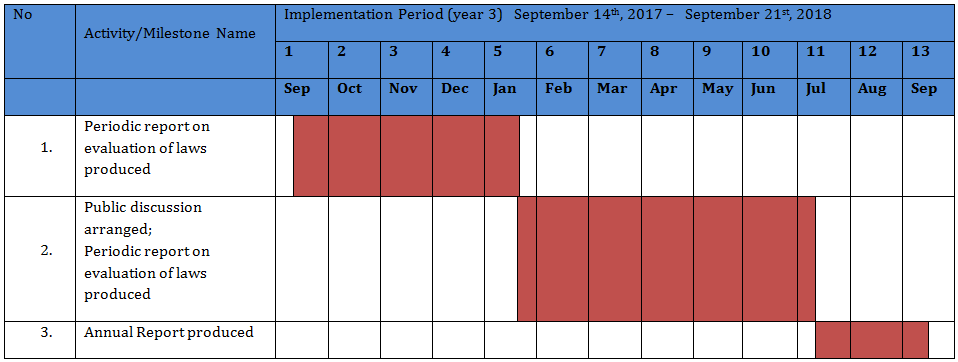
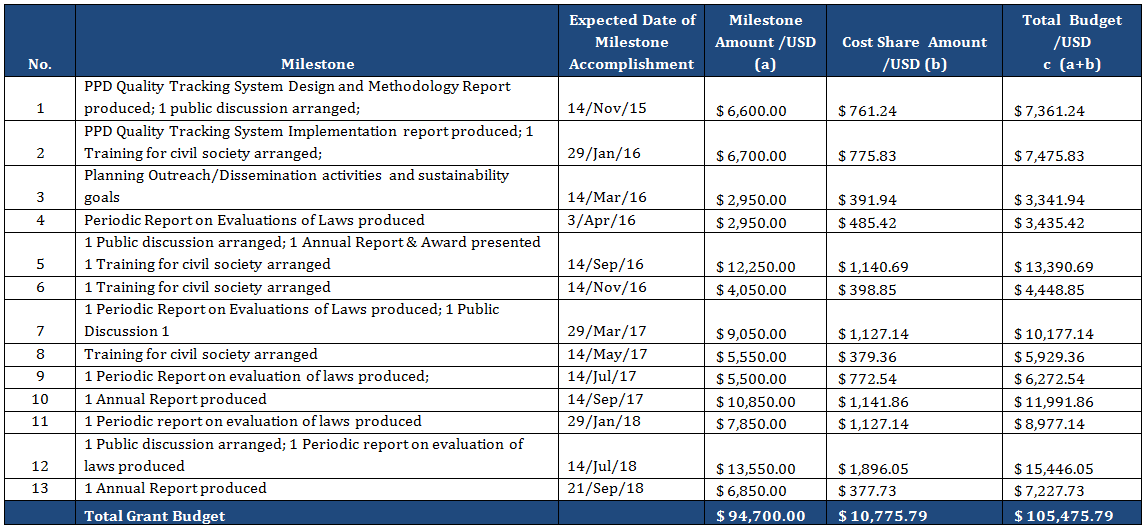
Grant agreement
|
The goal of the project is to support the Government of Georgia to create a better enabling environment in which legal and regulatory reforms are fairly and transparently conceived, implemented and enforced providing a level playing field for small and medium size enterprise growth.
View more →
|
| Strategic Plan Georgia 2020 - Strengthening Public Involvement (ZigB) (2015-2016) |
Federal Foreign Office of Germany |
2015-2016 |
€94,785 |

Name of Grant Activity: Strategic Plan Georgia 2020 – Strengthening Public Involvement (ZigB)
Donor Organization: Federal Foreign Office of Germany
Grant Recipient: Institute for Development of Freedom of Information
Partner Organization: Bremen University
Total Grant Amount: 94.785 €
Period of Performance: 10 July, 2015-10 February, 2016
Objectives:
The goal of the project is to raise the awareness among civil society groups and to strengthen the understanding of Georgia’s socio-economic development strategy “Georgia 2020”. To identify problems and to formulate relevant recommendations, existing challenges and the implementation process of the strategy will be critically analyzed.
Current State:
The strategic document “Georgia 2020” discusses the most critical problems that hamper the sustainable economic growth of Georgia and analyzes the ways to overcome these obstacles. The problems identified are - low level of competitiveness, insufficiently developed human resources (Educational System, Health Care and Social Protection System) and the credit accessibility. Based on the current situation, the main goal of the Government of Georgia is identified as - supporting private sector, supporting development of human resources and improving the financial availability. To eradicate the aforementioned problems by the year of 2020, various activities and measures to be taken are included in strategy. The Government of Georgia has already started reforms in certain areas to reach the objectives of the strategy “Georgia 2020”, which provides an opportunity to critically analyze the implementation process.
Activities:
• Supporting analysts:
o Organizing three day workshop and holding lectures and discussions about “Georgia 2020”;
o Selecting four analysts to receive the stipend over the four month period;
o Awarding the best analyst during the concluding forum of the project;
• Holding five series of lectures in various universities across Georgia (Batumi, Kutaisi, Telavi, Akhaltsikhe, Tbilisi);
• Holding discussions about the strategic document “Georgia 2020”, with the participation of government officials and the representatives of other interested parties. Five public discussions will be organized, where representatives of various governmental entities and stakeholders will be invited;
• Organizing a concluding conference the strategic document “Georgia 2020”. Along with Georgian experts, the conference will host number of foreign experts and academics working on Georgia’s social-economic problems;
• Publishing a concluding report, which will include the works of analysts participating in the contest and analytical pieces and recommendations by the experts and researchers.
Target Audience:
The target group of the project include analysts, activists of civil society, Georgian researchers and students and other stakeholders affected by the Government’s activities undertaken in the name of the strategic document “Georgia 2020”.
Success indicators:
The success of the project will be tested in various ways. The level of civil engagement will be measured by the number of participants and the quality of their input in the activities planned within the framework of the project. To identify the problems and to formulate the recommendations, the concluding report will be published that will be introduced to the Government of Georgia.
The activities planned to raise public awareness about the project:
In order to attract the public attention, there will be a constant communication with Georgian mass media throughout the entire duration of the project. IDFI has contacts with numerous print and online media outlets. Moreover, the institute has conducted number of successful PR campaigns in the past.
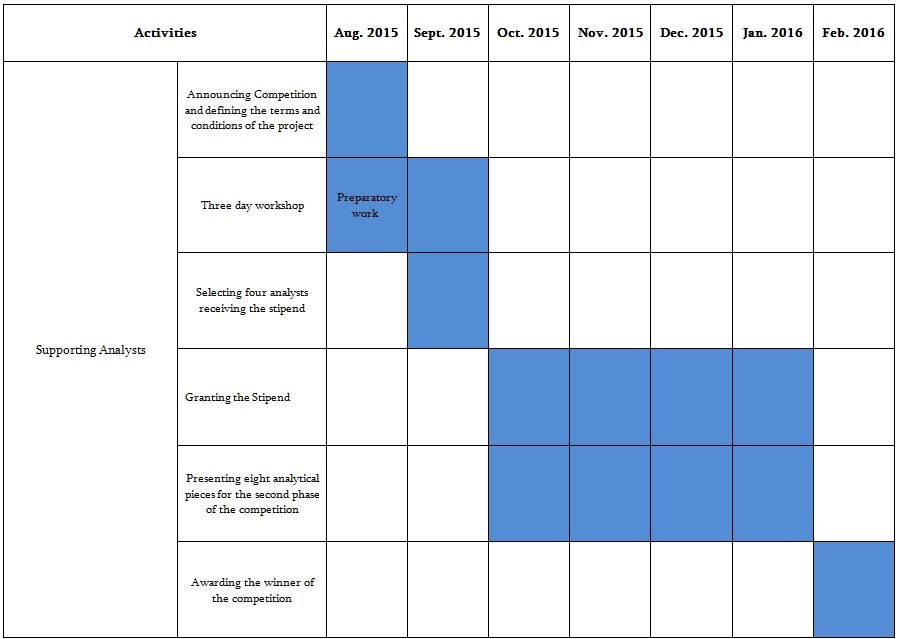 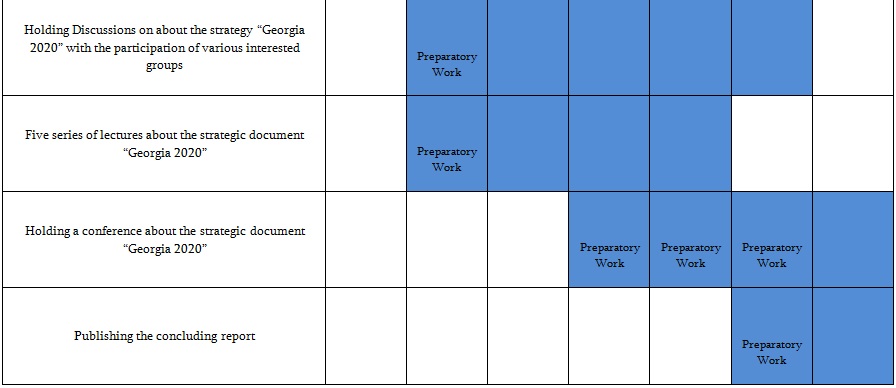

Grant agreement
|
The aim of the project is to promote discussions about the Socio-Economic Development Strategy of Georgia “Georgia 2020”, to raise public awareness and to facilitate discussions about the goals of the strategy.
View more →
|
| Open Data: Source for Changes and Innovations |
Tetra Tech ARD/USAID |
2015-2016 |
GEL56,584 |
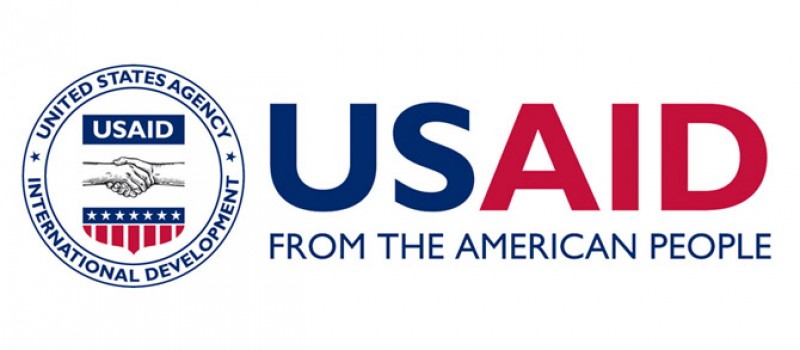
GOOD GOVERNANCE INITIATIVE (GGI) IN GEORGIA
Project Name: "Open Data: Source for Changes and Innovations"
Donor Organization: Tetra Tech ARD, implementer of the USAID Good Governance Initiative in Georgia Project.
Country: Georgia.
Project Number: GGI-G-002
Grant Amount: GEL 56,584 (Fifty Six Thousand and Five Hundred Eighty Four Georgian Lari)
Period of Performance: September 1, 2015 – January 30, 2016
Project Description
The Government of Georgia implements the Transparency and Accountability agenda reflected in Georgia’s National Action Plan 2014-2015 for the Open Governement Partnership (OGP).
As important part of the overall effort to open government, GoG releases public data to help citizens of Georgia and other stakeholders to understand how government works and how policies are made. Government open data is a valuable resource that is as yet largely unexploited in Georgia. This potential can be effectively employed if the Government authorities turn public government data into open data. To this end information web portal www.data.gov.ge is intended to serve as one of the central sites for the open government data.
Currently, open data web portal www.data.gov.ge lacks great amount of datasets due to the weak performance of the GoG agencies and sub agencies in releasing open public data for the web portal.
In part with solid awareness raising campaign on the benefits of the open data, the project aims to improve functional effectiveness of the open data web portal www.data.gov.ge through involvement of civil society organisation with its expertise and monitoring. Over the years IDFI has been actively developing open data standards in Georgia. IDFI has substantial experience in identifying problems and preparing studies as well as recommendations in issues related to the Open government and Freedom of Information. IDFI has been regularly monitoring disclosure of databases of open data. Within the framework of the project using Freedom of Information (FOI) requests IDFI will identify the existing open government data in the GoG agencies that could be released for the web portal www.data.gov.ge; With the involvement of subject matter experts IDFI will monitor and evaluate the level of accountability, proactivity, efficiency, clarity and usefulness of the GoG agencies in releasing open public data for the web portal www.data.gov.ge; IDFI will also evaluate quality, usefulness and intelligibility of published data in terms of supporting the transparency and openness of governance of the country; as well as accuracy of released data and compliance with pre-established standards; In order to identify public demands and expectation on open government data IDFI will organize 1 workshop in Tbilisi and at least 2 workshops in GGI Partner municipalities. The workshops will increase public understanding of: a) electronic platforms for citizen communication, including www.my.gov.ge and www.data gov.ge; b) level of accountability of the GoG agencies in releasing open public data for the web portal www.data.gov.ge; IDFI will prepare mid-term and final reports which will include all outcomes of the project. The final report will provide recommendations to Data Exchange Agency (DEA) on how to improve open data request and data collection procedures as well as quality of the submitted open data. The report will also include recommendations to the GoG agencies to ensure further improvement of their level of accountability and proactivity in releasing open public data for the web portal www.data.gov.ge. IDFI will organize close out event with participation of all relevant stakeholders to present final report of the project, including findings and recommendations. Successful implementation of the project will further develop functional capabilities of the open data web portal www.data.gov.ge through more active and accountable participation of the GoG agencies at the same time it will significantly contribute to the improvement of public data disclosure process in order to ensure transparency and accountability of the Government and to support innovation, business development and economic growth of the country. Project will also Increase public understanding and awareness of citizen communication electronic platforms including: www.my.gov.ge and www.data.gov.ge.
Goal and objectives
Goal of the project is to support of further development of www.data.gov.ge and implementation of open data standards in public sector of Georgia.
Main objectives of the project are:
1. To Identify existing GoG datasets that should be published on open data portals 2. To evaluate accuracy, quality and intelligibility of published data 3. To Identify public interest for data that should be published on www.data.gov.ge4. To draft package of recommendations for development of www.data.gov.ge and implementation of open data standards in public sector. Proposed approach and strategy1. Based on the information received in response to FOI requests IDFI will study and describe those datasets held by public institutions, disclosure of which will make www.data.gov.ge a more complete and usable resource.
2. Within the framework of the project the Institute will not merely describe the existing datasets, but will identify the most requested and significant datasets. With this in mind IDFI will request from public institutions the statistical information on the most requested data on their activities according to the categories of the requesters such as citizens, business, investors etc. In parallel with this IDFI will organize public meetings in order to analyze the list of data suggested by citizens or other interested parties, which will form the basis for recommendations to improve www.data.gov.ge.
Technical Approach
1. Using Freedom of Information (FOI) requests IDFI will Identify the existing open government data in the GoG agencies that could be released for the web portal www.data.gov.ge; 2. After Identifying the existing open government data in Government of Georgia (GoG) agencies IDFI will monitor and evaluate the level of accountability and proactivity of the GoG agencies in releasing open public data for the web portal www.data.gov.ge; 3. IDFI will monitor and evaluate the level of efficiency, clarity and usefulness of the GoG agencies in releasing open government data for the web portal www.data.gov.ge; 4. By monitoring of the www.data.gov.ge IDFI will evaluate quality and intelligibility of published data in terms of supporting the transparency and openness of governance of the country;
5. IDFI will request all legal documents and procedures to evaluate level of accuracy of released data and compliance with pre-established standards;
6. To identify public demands and expectation on open government data IDFI will organize 1 workshop in Tbilisi and at least 2 workshops in GGI Partner municipalities. The workshops will increase public understanding of: a) electronic platforms for citizen communication, including www.my.gov.ge and www.data gov.ge; b) level of accountability of the GoG agencies in releasing open public data for the web portal www.data.gov.ge. 7. IDFI will publish mid-term and final reports which will include all outcomes of the project. The final report will provide recommendations to Data Exchange Agency (DEA) on how to improve open data request and data collection procedures as well as quality of the submitted open data. The report will also include recommendations to the GoG agencies to ensure further improvement of their level of accountability and proactivity in releasing open public data for the web portal www.data.gov.ge.
Activity Plan
Grant agreement
|
Goal of the project is to support of further development of www.data.gov.ge and implementation of open data standards in public sector of Georgia. The Government of Georgia implements the Transparency and Accountability agenda reflected in the Open Government of Georgia’s National Action Plan 2014-2015.
View more →
|
| Supporting and Monitoring of the Transition to Digital Terrestrial Broadcasting in Georgia (2015) |
Open Society Georgia Foundation |
2015-2016 |
$40,814.98 |
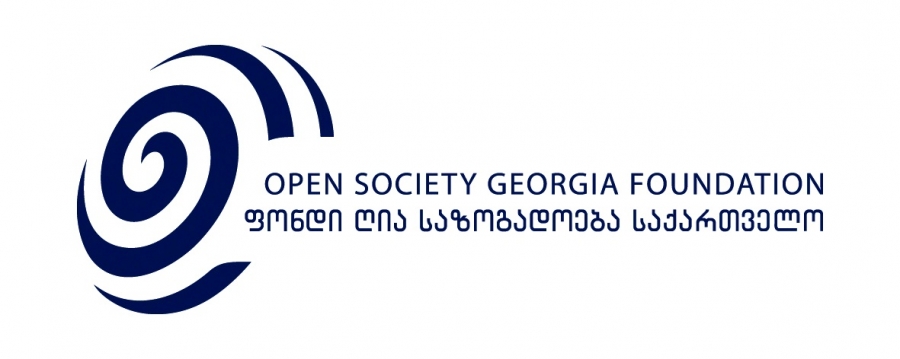
Name of the project: Supporting and Monitoring of the Transition to Digital Terrestrial Broadcasting in Georgia (2015)
Financial Support: Open Society Georgia Foundation – OSGF
Budget: 40,814.98 USD
Project Dates: April 2015 - February, 2016
Project description
The most essential directions of the activities that were implemented in 2014 are: Purchasing lots of frequencies to build broadcasting network by private companies and transferring frequencies to the regional televisions free of charge, defining the 30-35 % lower tariff for TV broadcasters comparing to average European price in order to spread programs and starting building of private network infrastructure; Revealing the company that will build the proper net for the Public Broadcaster through competition and starting to build the mentioned network; Making decision to give 220 000 unit receivers to socially vulnerable customers free of charge and fixation low prices ( 40 GEL) on these equipment as a result of competition; Giving license to regional and local televisions free of charge and optimization of frequencies given to them.
In spite of positive outcomes, big part of activities planned by state has not been fulfilled in 2014 because of subjective and objective reasons. Building of broadcasting network did not start on time, as well as informational campaign and the process of distributing receivers. Accordingly, advocacy of this process was not carried out.
2015 year is very important period for Digital Terrestrial in Georgia. In July-August, national analogous broadcasting networks will be turned off. Switching off the analogous broadcasting to regional and local televisions will be ended in 31 December, 2015 although their activation is planned in June of this year. One of the main purposes of this project is to support and advocate information campaign.
Involvement of the organization is essential in process supervision to build the network and fulfill license conditions, distributing receivers to socially vulnerable customers, also in order to monitor the market of terminals for digital service. Also, making amendments in legal acts regulating process of transferring to digital broadcasting should be done, but at first place in the laws regarding “Electronic Communication” and “Broadcasting” in Georgia
Mentioned changes define the conjuncture and future of broadcasting market. Intensive participation, involvement and advocacy of this process is very important. Advocacy of implementation of digital switchover strategy is also essential, along with adopting strategic documents. It is especially important to conduct the last stage of the process in accordance of rightly planned procedures.
It’s much prioritized, that the issue of accessing the broadcasting network of signals of current national, local and regional broadcasters should be controlled, in order to reveal and remove systematic and non systematic obstacles. The role of Georgian national communication commission is very important in this process. The process started in 2014 and will be finished in the end of 2015, according to the state action plan.
Goals
We think that over the next 10-month period monitoring of the transition to digital broadcasting of Georgia will be covered during the project in the following ways:
- To proceed the final stage of transition to digital broadcasting platform in a democratic way and reflect interests of operators of Georgian media market and broadcasters as much as possible.
- Eradicate the technical, legal and economic barriers of the transition to digital broadcasting with active involvement.
- Monitor the activities, outline the problematic aspects, make recommendations and advocate in the following cases: Georgian National Communications Commission, LEPL “Digital Broadcasting Agency”, Licensees of the digital broadcasting network, “Georgian TeleRadioCenter” LLC, and Georgian Public Broadcaster.
Activities
In order for the Georgian media environment to be improved in the project period, it is of utmost importance that the final stage of transition to digital broadcasting is successfully implemented. The activities must be carried out in four directions:
- Monitoring of the process of information campaign of transition to digital broadcasting, Advocacy and promotion by preparing and presenting recommendations. Also preparing highly professional studies, monitoring effectiveness of social awareness raising campaign and research of the marketing efficiency.
- Involvement in the process of legal changes in the development and implementation of transition to digital broadcasting, evaluation, making recommendations, promotion and advocacy.
- Monitoring of the activities of the Ministry of Economy and Sustainable Development of Georgia, Digital Broadcasting Agency, Georgian National Communications Commission, “Georgian TeleRadioCenter” LLC, LEPL Georgian Public Broadcaster, Licensees of the digital broadcasting network (national and local coverage operators) related to transition to digital broadcasting process.
- Monitoring the process of distribution of the technical equipment needed for receiving digital broadcasting, study of market and society readiness, making recommendations and advocating for their implementation.
Ways for Implementation
During the project activities will cover the following major areas:
- Monitoring of license conditions, including the coverage of population, placing of TV programs and other important actions implemented by “Georgian TeleRadioCenter” LLC, “Stereo+” LLC, and local licensees of the digital broadcasting network. Also preparing study of problematic cases and providing recommendations for the activities to be implemented.
- Studying the strategy of information campaign on digital switchover made by LEPL “Georgian Public Broadcaster” and commercial broadcasters, as well as legislative changes and planned activities, and preparing recommendations.
- Evaluation of the process and intensity of information campaign on digital switchover, studying effectiveness of the channels of communication with citizens; Estimation of the effectiveness of the information campaign and readiness index of the population.
- Studying the consideration of interests of socially unprotected citizens, also studying, studying events aimed at integration and accessibility of services for users with disabilities and preparing recommendations to identify existing gaps.
- Studying the problems of the local TVs associated with transition to digital broadcasting and presenting recommendations.
- Supporting transparency of the conditions behind placing channels in digital terrestrial television network; supporting implementation of recommendations and advocating non-discriminatory and cost-oriented conditions.
- Studying the problems which arise from subsidization of end users, also from distribution and installation of digital broadcasting equipment as well as other problems related with the installation of the antennas and the other technical matters related with regulations.
- Studying of problems related with openness and interoperability of software receivers and preparing recommendations.
- Research of development of state broadcasting network, construction deadlines and research of quality with so-called 20 test point selection.
- Studying whether the interests of ethnical minorities are considered during the process of transition to digital broadcasting.
The project will be implemented via various tools such as: by research of the current state of affairs, requests of public information, face-to-face meetings and roundtable discussions, analysis of the results, SWAT analysis in order to identify problematic directions, presenting recommendations to the relevant authorities and making presentations, involvement in legislation drafting process, monitoring and analysis of the implementation process. Quarterly and thematic reports will be prepared about the results.
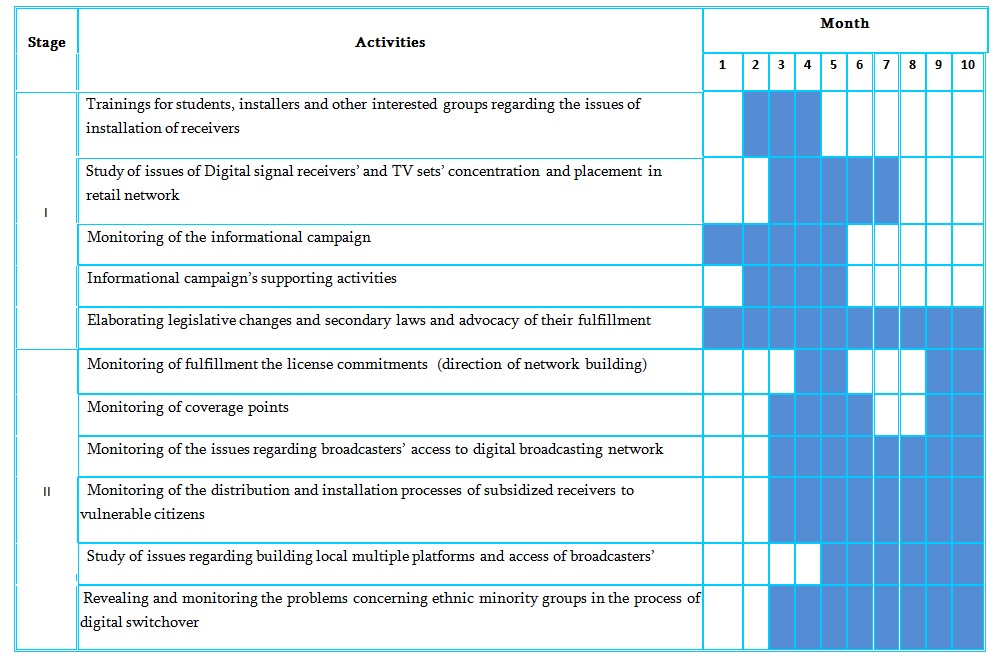
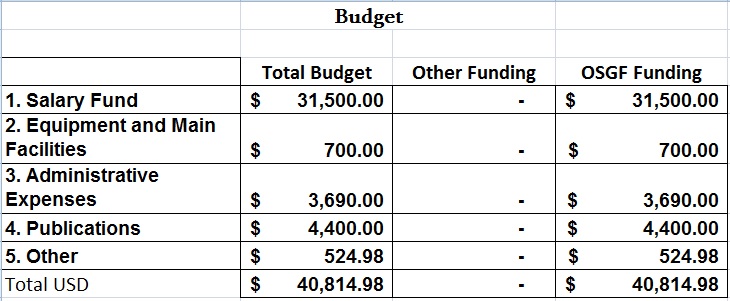
Grant agreement
|
The project aims 1) to proceed the final stage of transition to digital broadcasting platform in a democratic way and reflect interests of operators of Georgian media market and broadcasters as much as possible; 2) Eradicate the technical, legal and economic barriers of the transition to digital broadcasting with active involvement; and 3) Monitor the activities, outline the problematic aspects, make recommendations and advocate in the following cases: Georgian National Communications Commission, LEPL “Digital Broadcasting Agency”, Licensees of the digital broadcasting network, “Georgian TeleRadioCenter” LLC, and Georgian Public Broadcaster.
View more →
|
| Family Support Policy – EU Member States and Georgia |
MagtiCom LTD |
2015 |
GEL35,000 |
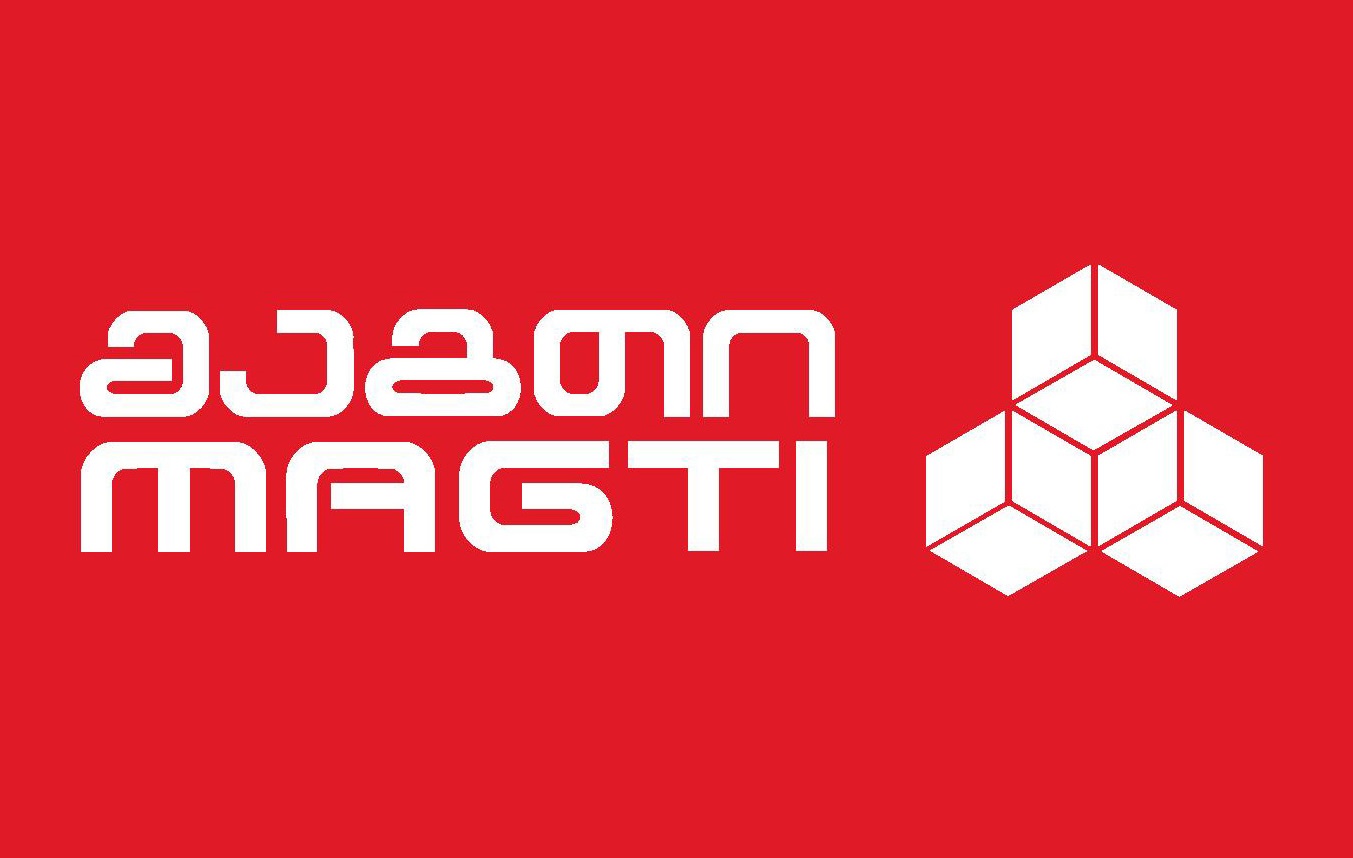
Project Name: Family Support Policy – EU Member States and Georgia
Donor Organization: MagtiCom LTD
Grant Amount: 35,000 GEL
Period of Performance: April – December, 2015
Project Description
According to UN, Georgia is among 20 countries worldwide which are affected with depopulation. Economic hardships, as well as political instability in the country have resulted in critically low birth-rates and increased death rates. In contrast with 1980ies, when there were approximately 94 thousand newborns annually, currently this number has almost halved.
One of the important factors which can improve demographic situation in a country, is state social policy, a combination of state assistance and support programs, as well as active involvement of the society. Unfortunately, the programs that have existed until today, as well as current ones can be assessed as ineffective, which has resulted in more active work from CSOs.
Goal
The Goal of the project is to prepare recommendations and a project of legislative initiatives for the state policy supporting families with many children, based on analysis of public information as well as international practice.
Activities
- Analysis of demographic data of Georgia
- Analysis of international best practice of demographic and social policy
- Preparing recommendations and a project of legislative initiatives for state support policy
Grant agreement
|
The goal of the project is to prepare recommendations and a project of legislative initiatives for the state policy supporting families with many children, based on analysis of public information as well as international practice.
View more →
|
| Supporting Parliament of Georgia Involvement in Open Government Partnership Initiative |
UNDP |
2014-2015 |
$149.700,30 |
.jpg)
The Project is funded in the framework of European Union and the Parliament of Georgia Program: “Strengthening the System of Parliamentary Democracy in Georgia Project Document” which is implemented by the United Nations Development Programme (UNDP)
Project Name: Supporting Parliament of Georgia Involvement in Open Government Partnership Initiative
Donor Organization: United Nations Development Programme (UNDP).
Country: Georgia. Through the European Union funded Program: “Strengthening the System of Parliamentary Democracy in Georgia Project Document”
Partner organization: Parliament of Georgia
Grant Amount: 149 700,30 USD
Period of Performance: December 10, 2014 – November 30, 2015.
Background
Open Government Partnership (OGP) is a multilateral initiative that aims to secure concrete commitments from governments to promote transparency, empower citizens, fight corruption, and harness new technologies to make government more open, effective and accountable, leading to more efficient use of public resources, innovation and inclusive growth. It was launched by eight founding governments, including the United States and the United Kingdom. UNDP is an active supporter of the OGP globally, especially in the component of Legislative Openness.
In September 2011 Georgia joined OGP. Among 65 OGP member countries, at the onset of its membership, Georgia was scored among the highest (15 out of 16 maximum) on budget transparency, access to information and asset disclosure. Nonetheless, Georgia received one of the lowest scores on citizen engagement, which highlights the need to strengthen its capacity to communicate with citizens and civil society. The Government of Georgia committed to increase transparency and accountability within its national institutions, as well as enhance citizen participation, improve government services and integrity in public sector. As an OGP member state, Georgia dedicated itself to transparent and collaborative processes in public service, state procurement, public finances, and administration of justice, public participation and developing innovative technologies. Within almost three years Georgia managed to adopt and implement the first Action Plan (2012-13), participate in the OGP Steering Committee elections and adopt the second Action Plan (2014-15). In September 2014, Georgia was elected as an OGP Steering Committee Member for two years.
OGP Georgia 2014-15 Action Plan encompasses 27 commitments and 16 responsible agencies. The commitments meet four challenges of OGP: public service, increase of public participation, improved management of public resources and creating safe environment. It is notable that both Action Plans of the Government of Georgia (2012-2013 and 2014-15) were elaborated with the active cooperation of the government and the civil society. Representatives of Government and NGOs had been cooperating through the national coordination mechanism – Forum, which is co-chaired by the Government through the Ministry of Justice and the civil society through the IDFI.
Despite the advocacy of the civil society organization in Georgia, commitment of the Parliament of Georgia was not included in the National Action Plan 2014-2015, namely supporting the civic engagement in legislative processes through establishing citizens’ petitions system and a tool to enable citizens to comment on draft laws.
In fact, parliaments’ engagement in citizen participation in democracy is crucial. Parliaments as representative branches of democratic governments are meant to provide citizens with links to the policy-making process and with methods of holding the executive branch to account. As a place for informed debate on the issues affecting citizens, parliaments are ultimately responsible for finding compromise among competing interests, enacting these compromises into laws, and ensuring their successful implementation. Meaningful commitments to advance parliamentary openness should demonstrate a respect for citizens’ right to openness, participation and accountability, as well as a desire to deepen the relationship of trust between citizens and their parliaments more broadly.
OGP pays much attention especially to Legislative Openness which is the newest direction in OGP (as most of the commitments are related to Executive branch of the government.). Legislative Openness Working Group (LOWG) provides peer to peer support and sharing of experience, in response to specific requests from partners.
Overall Objective
Openness and transparency of the Parliament of Georgia must be increased and effective citizen participation in legislative processes has to be ensured through active engagement of the Parliament in OGP.
Specific Objectives
- Raising awareness of the Parliament on Open Government Partnership and Legislative Openness
- Developing and adopting Open Parliament Georgia Action Plan by the Parliament of Georgia
- Launching the process of Open Parliament Georgia Action Plan implementation
Expected Outputs
- Members and Staff of the Parliament of Georgia are aware of the concept of open parliament concept and importance of transparent legislative processes
- Strategy, commitments and mechanisms of institutionalizing the concept of open parliament are elaborated and its monitoring tools are available to the Parliament
- Openness and transparency of the Georgian Parliament is improved through implementation of the commitments undertaken by the Open Parliament Georgia Action Plan.
Description of Activities
Over the period from 1 December 2014 to 30 November 2015, the project will focus on the following activities:
- Raising awareness of the Parliament on Open Government Partnership and Legislative Openness
- Prepare a study of international practices of parliament-related commitments in National Action Plans
- Organize an awareness raising workshop on OGP
- Open Parliament Georgia Action Plan will be developed and adopted by the Parliament of Georgia
- Draft the Terms of Reference of the Open Parliament Georgia Working Group
- Create Open Parliament Georgia Working Group
- Develop draft Open Parliament Georgia Action Plan
- Facilitate public consultations to finalize Open Parliament Georgia Action Plan
- Support peer exchanges and participation of the WG members at international OGP-related events
- Finalize the Open Parliament Georgia Action Plan for its adoption by the Parliament of Georgia
- Open Parliament Georgia Action Plan implementation process will be launched
- Support the WG in the implementation of the Action Plan
- Launch public awareness campaign
Action Plan
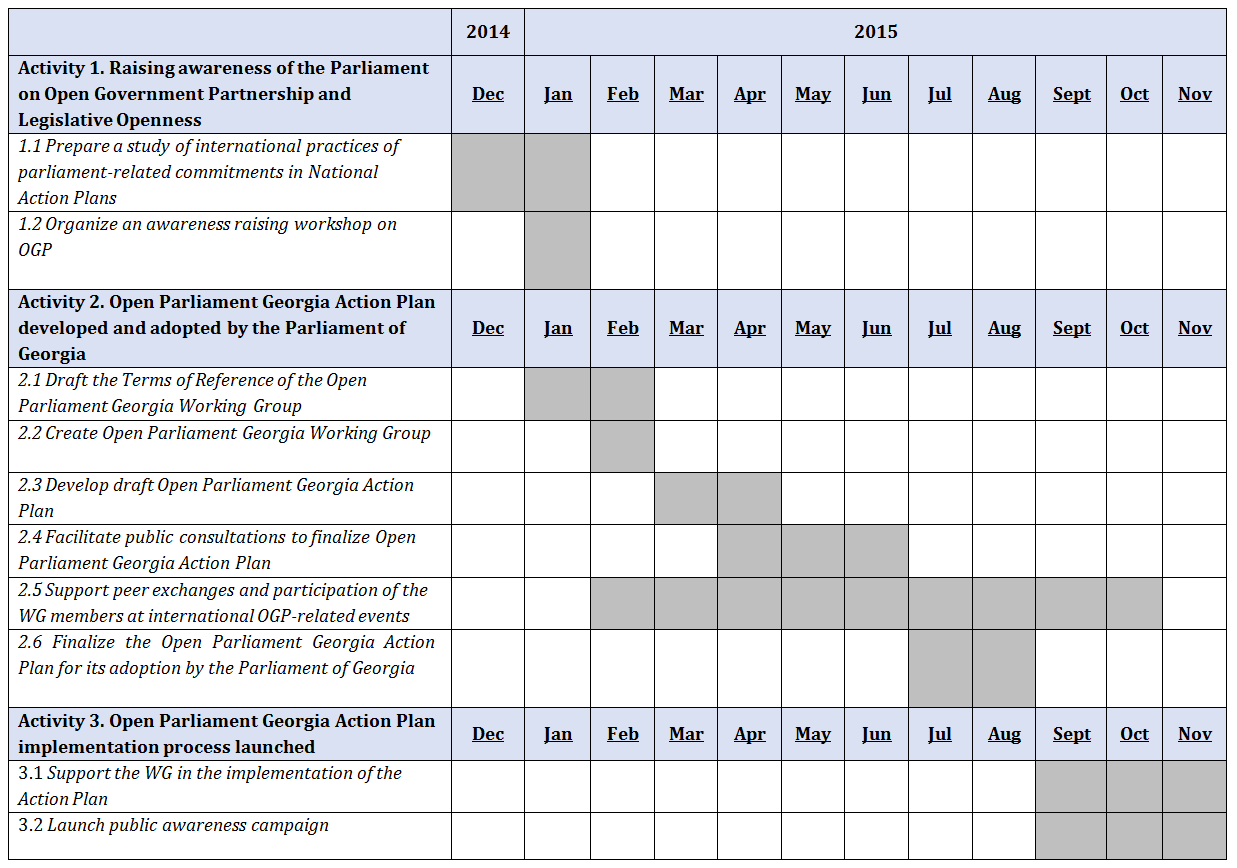

Please, see the project report here.
/public/upload/IDFI/OGP/Final Report Project.pdf
Call on EU to join OGP
The Bureau of the Parliament of Georgia Adopted the Open Parliament Georgia Action Plan
Parliament of Georgia has finalized working on the Open Parliament Georgia Action Plan
The Inter-Factional Group approved the Open Parliament Georgia Action Plan
The final version of the Open Parliament Georgia Action Plan was agreed between the Inter-Factional Group of the Parliament of Georgia and the Open Parliament Georgia Working Group
The Voice of a Customer - Open Government Partnership Reward Competition
Strengthening the role of the society in the process of drafting the Open Parliament Action Plan | 18 June 2015
Meeting with Students regarding Parliamentary Openness | 12 June 2015
The Opening Remark of the Chair of the Parliament of Georgia Regarding the Parliamentary Openness | 5 June 2015
OGP European Regional Meeting Has Closed | 4 June 2015
Faces of Open Government - Giorgi Kldiashvili | 3 June 2015
Regional meeting in Georgia regarding Open Government Partnership | 1 Junw 2015
The Field Meeting of the Inter-Factional Group and the Open Parliament Georgia Working Group | 25 May 2015
Meeting Regarding Recommendations on Parliamentary Openness |21 May 2015
First meeting with the students on the issues of the parlamentary openness | 15 May 2015
Meeting on the Issues of the Parliamentary Openness | 14 May 2015
Parliament of Georgia joined the Open Government Partnership | 1 May 2015
The Presentation of the Research – the Issues of Open Parliament in OGP Member Countries | 1 May 2015
Issues of Open Parliament in OGP Member Countries | 28 April 2015
The Meeting of the Non-Governmental and International Organizations of the Open Parliament Georgia Working Group | 27 April 2015
Signing the Declaration on Parliamentary Openness and the Memorandum | 24 April 2015
IDFI Organized the First Meeting of the Inter-Factional Group and the Open Parliament Georgia Working Group | 3 April 2015
Grant agreement
|
Overall Objective of the project is to increase openness and transparency of the Parliament of Georgia and ensure effective citizen participation in legislative processes through active engagement of the Parliament in OGP.
View more →
|
| Facilitate Open Government Partnership Initiative |
Good Governance in Georgia Program/USAID |
2014 |
GEL104.100 |
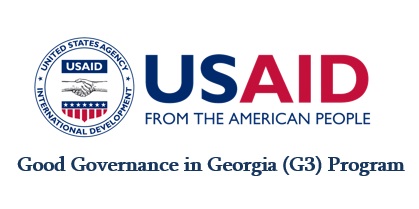
Project Name: Facilitate Open Government Partnership Initiative
Project dates: July 22 – November 1, 2014
Financial Support: USAID, Good Governance in Georgia (G-3) Program
Budget: 104,100.00 Georgian Lari (59 500,00 USD)
Project Description:
Open Government Partnership (OGP) is an international initiative to promote and seek commitments from participating governments to promote transparency, increase civic participation, fight corruption, and harness new technologies to make government more open, effective and accountable.
OGP was founded in 2011 upon the initiative of the presidents of the USA and Brazil and units 65 countries. As an OGP member state, Georgia dedicated itself to transparent and collaborative processes in public service, state procurement, public finances, and administration of justice, public participation and developing innovative technologies to achieve the above mentioned goals.
The OGP calls for country commitments in five (grand) challenges of: (1) improving public service delivery, (2) increasing public integrity, (3) more effectively managing public resources, (4) creating safer communities, and (5) increasing corporate accountability.
Among the 65 OGP member countries, at the onset of its membership, Georgia was scored among the highest (15 out of 16 maximum) on budget transparency, access to information and asset disclosure. Nonetheless, Georgia received one of the lowest scores on citizen engagement, which highlights the need to strengthen its capacity to communicate with citizens and civil society.
In 2014 Georgia created second National Action Plan 2014-2015 within the frame work of OGP. It comprises 27 commitments. The Government of Georgia’s OGP commitments are coordinated by the OGP Forum and its secretariat, which is a national coordination mechanism as foreseen under the Articles of Governance, and which is functioning in a new format since January 15, 2014.
Project Objectives:
The aim of this assistance is to facilitate the work of the Government of Georgia, through support to the GoG’s OGP Forum to advance the goals of the Open Government Partnership that include logistic and organizational support for the OGP Forum and manage OGP’s external communications through an intensive public awareness campaign on the OGP that will ensure the continuity of organizational relationships with OGP’s partners.
Project Activities:
• Plan and implement public awareness campaign on OGP at Central and Regional levels with various target groups
• In close consultations with Open Government Georgia Forum and its secretariat develop the design and content of the printed materials – Flayers and OGP Action Plan of Georgia 2014-2015 for domestic and international dissemination (in Georgian and English languages);
• Printed materials dissemination in Universities, libraries, Public Service Halls and USAID-funded Centers of Civic Engagement throughout Georgia
• Agree upon the theme, message and length of the videos with the Open Government Georgia Forum and its secretariat
• Produce the videos in different file formats suitable for television broadcast (local commercial and public television outlets), internet and social media platforms
Implemented Activites:
• 14 public awareness meetings were planned and conducted with students of various universities, media and NGO representatives, and librarians. Meetings were held in Tbilisi and in different regions – in Batumi, Kutaisi, Akhaltsikhe and Kvareli
• In close consultations with Open Government Georgia Forum and its secretariat develop the design and content of the printed materials
• In close consultations with Open Government Georgia Forum and its secretariat developed the design and content of flyers on OGP
• National Action Plan (2014-2015) in English/Georgian was printed. Design of was prepared and agreed with the Ministry of Justice of the Government.
• Shorthorn version National Action Plan (2014-2015) with illustration was printed in English and Georgian
• Printed Materials were delivered to universities, libraries, USAID Civic Engagement Centers. Part of these materials were delivered to the Ministry of Justice for dissemination to state agencies
• Three graphical videos on OGP were prepared according to the agreed content with the MoJ of Georgia. Videos were broadcasted by Public Broadcaster and privet TVs as well The first video describes the commitments taken by the government agencies. The second video describes the OGP in general.
Budget:

Open Government Partnership Action Plan Georgia 2014-2015
Open Government Parnership Action Plan Georgia 2014-2015 Brochure
Open Government Partnership (Video)
Workshop with Students of LibCenter about OGP
Bosnia and Herzegovina Joined OGP
OGP Celebrated Its Three-Year Anniversary
Discussion with students about OGP
Open Government Georgia Forum Holds its Next Meeting
Meetings with students for awareness raising on OGP continue
Civil Society Dialogue [VIDEO]
Seminars about OGP in different regions of Georgia
Workshops at University of Georgia and at GIPA
New Response Policy for OGP Countries
Another Monthly Meeting of OGG Forum Discussed Oversight Mechanism of the National Action Plan Implementation
Official website of Ministry of Internal Affairs has become adaptive for blind people
Grant agreement
|
The aim of this assistance is to facilitate the work of the Government of Georgia, through support to the GoG’s OGP Forum to advance the goals of the Open Government Partnership that include logistic and organizational support for the OGP Forum and manage OGP’s external communications through an intensive public awareness campaign on the OGP that will ensure the continuity of organizational relationships with OGP’s partners.
View more →
|
| Internet Freedom as Human Right in Georgia |
Embassy of the Kingdom of the Netherlands |
2014 |
€6,499.35 |

Name of Grant Activity: Internet Freedom as Human Right in Georgia
Donor Organization: Embassy of the Kingdom of the Netherlands
Grant Recipient: Institute for Development of Freedom of Information
Total Grant Amount: 6499.35 €
Period of Performance: November-December, 2014
In 2014 Web turns 25. This quarter of century has seen internet affect virtually all aspects of our lives including communication, services, education, news, entertainment, business, governance etc. However, along with the unarguable advantages, internet has also brought new challenges and debatable questions: how to protect human rights in internet? Should internet be regulated? If yes, how, by whom and to what extent?
While common to any country, these questions are of even more importance for those countries struggling with protecting human rights offline – Georgia, as one of the newer democracies, being one of the examples. Despite impressive progress in terms of e-governance, Georgia is still facing such basic problems as lack of internet access, with only less than half of its population being connected to World Wide Web. However, the biggest challenge remains lack of strategic view on internet development. Despite high level of public interest there have been considerably few opportunities to discuss and debate on such issues.
With the goal to fill this existing gap about internet as human right, there could be no better timing as December – since December 10th is celebrated worldwide as international human rights day. Thus, IDFI with the support of Embassy of the Kingdom of the Netherlands in Georgia plans to organize an event with the goal to promote discussion on diverse aspects of internet freedom as human right and create space for debate on whether, when, how and to what extent to regulate internet.
Activities:
Discussion "Internet as a Human Right", December 6th, Multimedia Education Centre (MEC)
- Moderator: Joseph Alexander Smith, Journalist, Georgia Today
- Key-note Speaker: Xander Bouwman, Social Media Activist (the Kingdom of Netherlands) – Internet access as a human right
Panel Discussion: Challenges of Internet Freedom in Georgia
- Internet access in Georgia: David Lee, President of MagtiCom
- Surveillance: Lasha Tughushi, Commission on Secret Surveillance, editor of newspaper "Resonance", chairman of Georgian Civil Society National Platform for the Eastern Partnership
- Hate speech: Gubaz Koberidze, No Hate Speech Movement, Council of Europe
- Copyright & Censorship: Giorgi Gogua, RFERL
Panel Discussion: Internet regulation – do’s and don’ts
- Tamta Tepnadze, Public Defender of Consumers’ Rights at GNCC (Georgian National Communications Commission)
- Nino Sarishvili, Office of the Personal Data Protection Inspector, Head of International Relations and Communications Department
- Zviad Koridze, Media expert
- David Kldiashvili, Georgian Charter of Journalistic Ethics, Secretary of the Council

Contract
Grant agreement
|
IDFI plans to organize an event with the goal to promote discussion on diverse aspects of internet freedom as human right and create space for debate on whether, when, how and to what extent to regulate internet.
View more →
|
| Supporting Establishment of New Standards of Transparency and Accountability at Tbilisi City Hall |
Open Society - Georgia Foundation |
2014-2015 |
$24,680 |

Title of the project: Concept for the New Web-Page of Tbilisi City Hall
Financial Support of the Project: "Open Society-Georgia" Foundation (OSGF)
Budget of the Project: $ 24680
Duration of the project: October 2014 - February 2015
Long term perspective of the project
With creation and implementation of a new concept of the web-page of Tbilisi City Hall guaranteed proactive access of the public information and formation of a citizen-oriented informational web-system.
Objectives of the Project:
- Increasing the level of transparency and accountability of Tbilisi City Hall;
- Promoting effective and transparent spending of public funds;
- Supporting the development of freedom of information via establishing the standards of e-democracy;
- Improving the public control on the public service agencies with the involvement of the citizens, ngo sector and media;
- Informing the citizens and increasing their engagement in the discussion and decision-making process in the public sector.
Project Description
Specifying the Project (Analysis of the current state)
For years citizens were putting questions about the accountability and transparency of the Tbilisi City Hall. This was mainly caused by not having the financial and other kind of data about the Tbilisi City Hall and the non-commercial and private legal persons that where under its subordination. At the same time journalists and other interested persons were not given the possibility to evaluate level of effectiveness and fullfillment of the obligations by the decision making personalities of the Tbilisi City Hall that was mainly caused by the restriction of the access to public information. Besides citizens were not equipped with the legal mechanizms and methods that would give them the opportunity for fully taking part in the city governance.
We think that, on the one hand, for eradication of these problems, it is very important to inform citizens and to have a maximum transparency in the financial and other key data about the Tbilisi City Hall. On the other hand, the abovementioned agency should start implementing services that oriented on citizens activities and involvments. Formation of a new web-page will have utmost importance to accomplish these aims. We have advised our view to Tbilisi City Hall – about issues that we think is essential for eradicating the current problems and implementing new trends.
Project Implementation Ways
Strategy
- The study of the internal procedures of the Tbilisi City Hall and logicasl designation of the frames of business-procedures;
- The determination of the current public requirements towards the new web-page;
- The collaboration of the concept and the prototype of the web-page.
Methods of Implementation
The study of the internal procedures of the Tbilisi City Hall and logical designation of the frames of business-procedures
Tbilisi City Hall, as a system, is one of the biggest and most difficult, from the governance point of view, public body. In order to determine the content of the web-page, to unify the standards of the disclosure of the public information, to combine the current information about municipalities, commercial entities and non-commercial legal persons in a single system and to draw out corresponding procedural documents, it is necessary to work up and research the internal business-procedures and the information about the management.
On the first stage of the project, it is planned to collect and analyze the information about the internal managerial procedures of the Tbilisi City Hall with the collaboration of the corresponding personalities of the Tbilisi City Hall. Initial studies of the work up, exchange and publishing of the information in the Tbilisi City Hall and its structural or dependant bodies is essential for effective functioning, sharing the responsibilities and obligations, evaluating administrative resources and technical opportunities, for integration and development in current and upcoming electronic service web-page.
The determination of the current public requirements towards the new web-page
It is important to understand the expectations and the requirements of the consumers (both from the side of service and information recipients) of the web-page in order to determine its functional and the content. From one point availability of public information is important, and from the other point, Tbilisi City Hall offers various services and programs to habitants of Tbilisi. Accordingly, both informational content sector and services, applications and other activation mechanisms of involvement sector should be integrated in the web-page. Correspondingly, it is necessary to determine the priorities of the web-page from the functional point of view. Public meeting with the relevant organizations and experts will help us in drawing out the additional indicators that must be taken into account in creating the technical assignment project.
At the same time it is important to research the best international practice, based on which the modern technical and innovative projects should be offered. The analysis of the innovative systems or transparency mechanisms of the web-pages of the foreign countries municipalities will assist the project’s team to consider the modern standards, and on the other hand to work out the conceptual document and recommendations based on the arguments and international practice.
The collaboration of the concept and the prototype of the web-page
After the research of the administrative and consumers sides, based on the received information and international practice the detailed description of the web-page will be drawn out that implies:
- Preparation of the description of the structure and navigation of the web-page;
- Preparation of the necessary technical instruction for collaborating of the web-page;
- Designation of the structure of the division of public information and open data and its management optimizing plan;
- Determination of the structure of involvement applications (platform of petitions, online platform for defending the nature and cultural heritage; public consultations platform);
- Preparation of technical instruction for the systemic requirements of the web-page and for the cyber-safety regulations;
- Preparation of the content sharing, basic functional and navigation descriptive HTML prototype.
Finished document, recommendations, the model of the web-page prototype and procedural documents will be presented on the name of the Tbilisi Mayor further for its technical creation.
Tbilisi City Hall, based on the collaborated conception of the initial agreement, particularly, non-commercial NNLE “Tbilisi Portal” will start the creation process of the web-page of Tbilisi City Hall. Consequently, consultations of the Tbilisi City Hall employees and the monitoring process of the performed activities will be important for the proper conduct of this process.
The Timeline of the Project
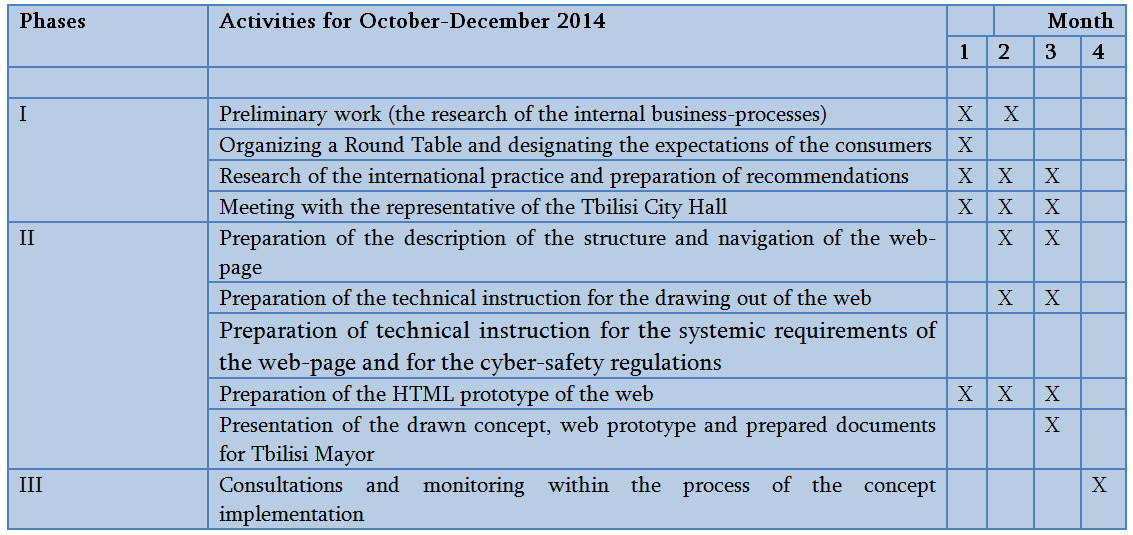
Budget
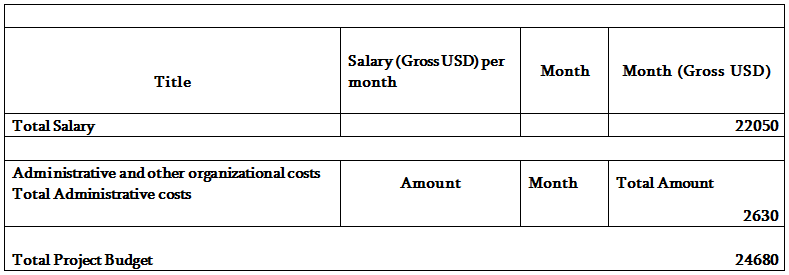
Grant agreement
|
With creation and implementation of a new concept of the web-page of Tbilisi City Hall guaranteed proactive access of the public information and formation of a citizen-oriented informational web-system.
View more →
|
| Strategic Plan Georgia 2020 – Strengthening Public Involvement (ZigB) (2014-2015) |
Bremen University |
2014-2015 |
€86,580 |
.bmp) 
Name of Grant Activity: Strategic Plan Georgia 2020 – Strengthening Public Involvement (ZigB)
Donor Organization: Federal Foreign Office of Germany
Grant Recipient: Institute for Development of Freedom of Information
Partner Organization: Bremen University
Total Grant Amount: 86 580 €
Period of Performance: 10 October, 2014-10 February, 2015
Objectives:
The project aims to give rise to the interest of various groups of civil society towards involvement and extension of knowledge about the Strategic Document (Socio-Economic Development Strategy of Georgia “Georgia-2020) in order for them to be more involved in discussions for the future.
Current State:
The problematic spheres that prevent the growth of Georgian economy are identified in strategic document with using Growth Diagnostic Method. These problems are - low level of competitiveness, insufficiently developed human resources (Educational System, Health Care and Social Protection System) and the credit accessibility. Based on the current situation main aim of the Georgian Government is specified in the document as supporting private sector, supporting development of human resources and improving the financial availability. Various activities and objectives are included in strategy to eradicate the aforementioned problems for the years of 2017-2020.
Project’s connection with other projects and activities of governmental and non-governmental organizations:
As Georgian government neither organized, nor initiated the public involvement process, there is no current possibility for understudying it.
Activities:
- Organizing the special-courses of Lecturers and PhD students of Georgian and Germany Universities at Georgian State universities (most importantly in regions), for example, in Batumi, Kutaisi, Telavi and in other regions. Four special-courses will be organized within the project: financial development, social protection systems, economic policy, and culture management.
- Supporting Georgian bloggers and young analytics:
- Organizing three day workshop for Georgian bloggers and young analytics of non-governmental organizations;
- Selecting the young Georgian bloggers and analytics of Georgian non-governmental organizations for receiving the financial assistance; granting a 3 month stipend;
- Organizing the Blogger’s Day for Georgian Bloggers and awarding them in various categories;
- Organizing the conference “Scientific Analysis of the Perspectives of the Strategic Document – “Georgia 2020” in February 2014. Famous German experts will be invited together with Georgian experts (with the collaboration of Tbilisi State University).
- Organizing the discussions in connection with the Strategic Document of Georgian Government “Georgia – 2020” with the presence of relative public groups. Three public discussions will be organized. Corresponding representatives of the relative ministries and state agencies, also other representatives of the given spheres will be invited to the discussions. The topics of the discussions will be the ongoing reforms in social protection sphere (healthcare and pension reforms) and educational reform, also current financial development of Georgia.
Target Group:
Target Groups of the project are social activists (bloggers, analytics of non-governmental organizations), Georgian scientists and students, also other stakeholders who are interested in state actions within the scopes of the strategic document.
Indicators of Success:
The success of the project will be experienced in various ways. The questionnaire will be spread among the researcher/scientist participants of the conference for the possible feedback. Also we’ll monitor the public discussions about the Strategic Document with the collaboration of the Georgian non-governmental organizations. Especially, we are expecting the big public response about the conference “Scientific Analysis of the Perspectives of the Strategic Document – “Georgia 2020” that will be held in February. Also after the end of the scholarship period we’ll receive the final document from the participants (bloggers/analytics of non-governmental organizations) that will also designate how was this scholarship used and whether the grant supported the development of the participants. Besides, the questionnaire should be spread during special courses, where the gained knowledge of each participant can be specified.
What activities are planned for raising the public awareness of the project:
For the project’s various activities, to attract the public attention, close connection with the Georgian media (TV channels, newspapers and web-pages) is being planned. IDFI has multiple contacts of printing and digital media, and at the same time IDFI has successfully launched various public awareness campaigns in former projects.
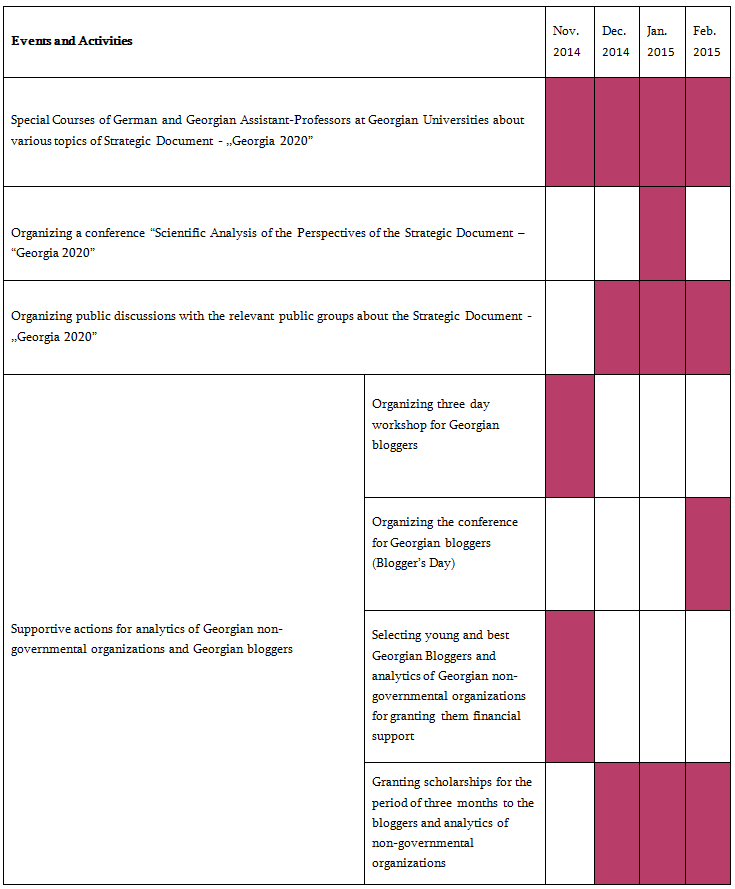
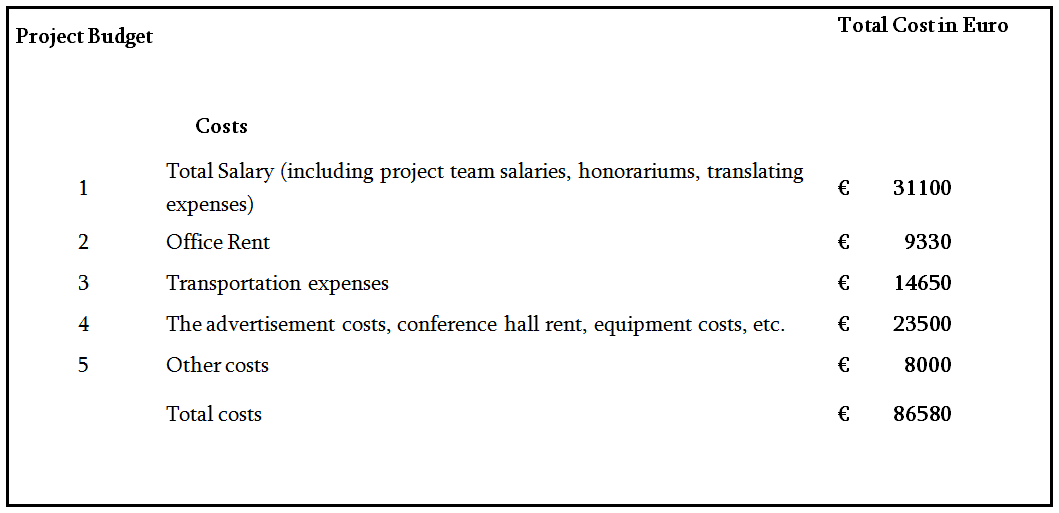
Grant agreement
|
The project aims to give rise to the interest of various groups of civil society towards involvement and extension of knowledge about the Strategic Document in order for them to be more involved in discussions for the future.
View more →
|
| Improving the Practice of Compliance with the Proactive Disclosure of Public Information Obligation by State Authorities of Georgia |
Good Governance in Georgia Program / USAID |
2014 |
$19,873.80 |

Name of Grant Activity: Improving the Practice of Compliance with the Proactive Disclosure of Public Information Obligation by State Authorities of Georgia
Donor Organization: USAID Good Governance in Georgia Program (G-3)
Grant Recipient: Institute for Development of Freedom of Information (IDFI)
Partner Organization: Georgian Young Lawyers’ Association (GYLA)
Grant Agreement No.: 493700.01-14-17-IDFI
Client Contract No.: AID-114-TO-11-00001
MSI Project No.: 493700.01
Type of Grant: Fixed Obligation Grant
Total Grant Amount: GEL 34,779.14 (USD 19 873,80)
Period of Performance: 25 Sept. – 27 Nov. 2014
Objectives:
The objective of this grant is to assist Government of Georgia institutions to effectively manage FOIA compliance, engage civil society in monitoring implementation of FOIA provisions, and publicize information on implementation and constraints to implementation of FOIA provisions.
Activities to be provided:
1. Study of the implementation process of Proactive Disclosure of Public Information in Georgia
In order to assess the level of online transparency of public sector, IDFI will research official web-sites of the state authorities of Georgia who are obliged by the decree of the Government of Georgia to publish information in the framework of the list accepted by the Government.
Research of the gained data will reveal compliance of the target institutions with the decree of GoG “About the Form of the Electronic Request of Information and Proactive Disclosure of Public Information”.
2. A statistical study of GoG’s compliance with the FOIA:
GYLA will request from target institutions (State Chancellery of Georgia, Ministries of Georgia, Offices of the State Minister of Georgia, Parliament of Georgia, and Supreme Court of Georgia) all FOIA requests (both electronic and written) received in 2013-2014 and administrative acts containing an answer in response to those requests.
Based on the documentation received, GYLA will categorize the issues of the most requested information by institution. Thus, by defining the public interest, it will be possible to identify the list which will be recommended for further improving the practice of e- transparency.
By analyzing the answers of institutions on the FOIA request, research team will be able to identify possible areas for improvement which are currently impeding transparent and citizen- oriented activities.
3. Case studies of international practice of 3 foreign countries with experience in implanting provisions to more readily disclose public information:
In addition to this study, the IDFI will provide research supplemented by case studies of 3 foreign countries (Italy, New Zealand, Canada), and with experience implementing FOIA provisions. The indicated countries have highest scores in terms of e-information and e-governance according to the latest, 2014 United Nations E-Government Survey.
4. Targeted focus groups with civil society organizations:
In order to gather feedback on the strengths and weaknesses of civil society interaction with the GoG institutions vis-à-vis requests for public information and take into account their practice and experience in this regard, three focus groups will be organized: two in Tbilisi and another in Adjara. NGO, media and civil society representatives from different regions will be invited to these events.
5. Workshop on best practices of disclosing public information for the GoG’s FOIA officers:
A workshop will be held with GoG stakeholders to present best practices revealed from the above-mentioned case studies and to present the combined statistical and focus group findings.
6. Providing recommendations for improving FOIA provision practice in Georgia:
Based on research findings, IDFI & GYLA will present a set of recommendations with the aim of improving the partner GoG institutions compliance with FOIA provisions. The package of recommendations will be delivered to all target public institutions.
Key Assumptions:
As a result of the activities conducted within the framework of the project:
- Paper on FOIA compliance by focus GOG institutions will be published;
- The new list of the public information to be proactively published will be identified;
- Paper on international experience on disclosing public information will be published;
- Recommendation paper on improving FOIA compliance by GoG institutions will be worked out.
Work Plan:
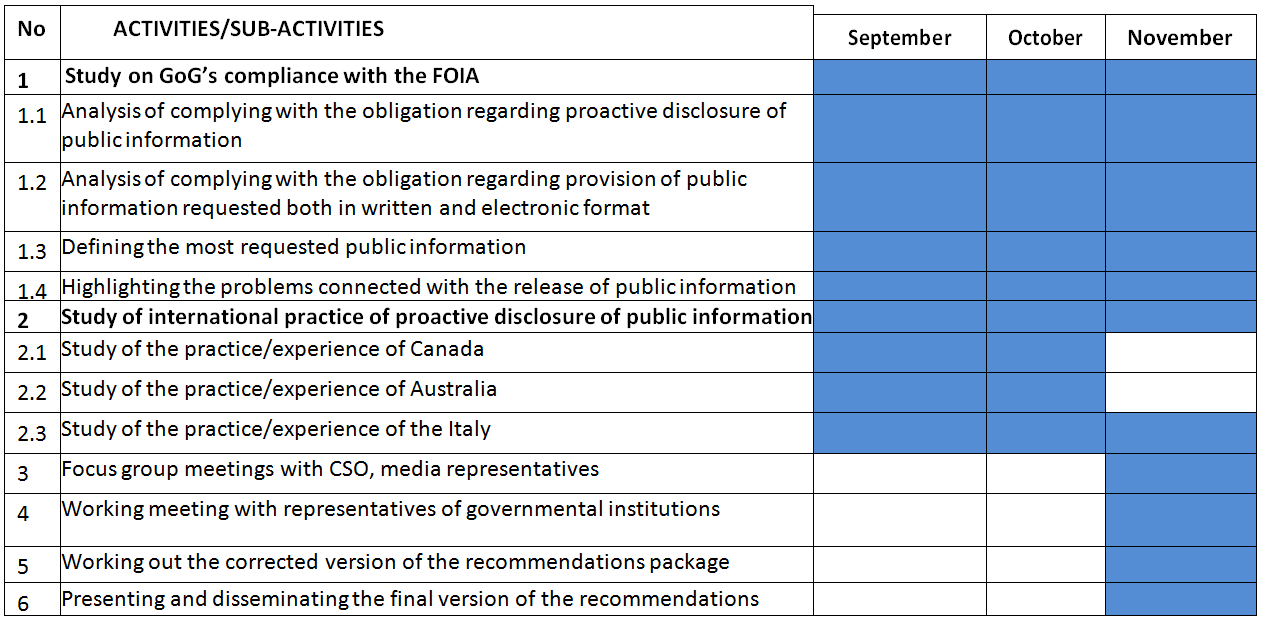
Detailed project budget:
/public/upload/projects/IDFI-Budget-9-19-2014-UPD.pdf
Contract
Grant agreement
|
The objective of this grant is to assist Government of Georgia institutions to effectively manage FOIA compliance, engage civil society in monitoring implementation of FOIA provisions, and publicize information on implementation and constraints to implementation of FOIA provisions.
View more →
|
| Georgian Public Services through Libraries |
IREX |
2014 |
0 |
IDFI is involved in the project as a volunteer partner
 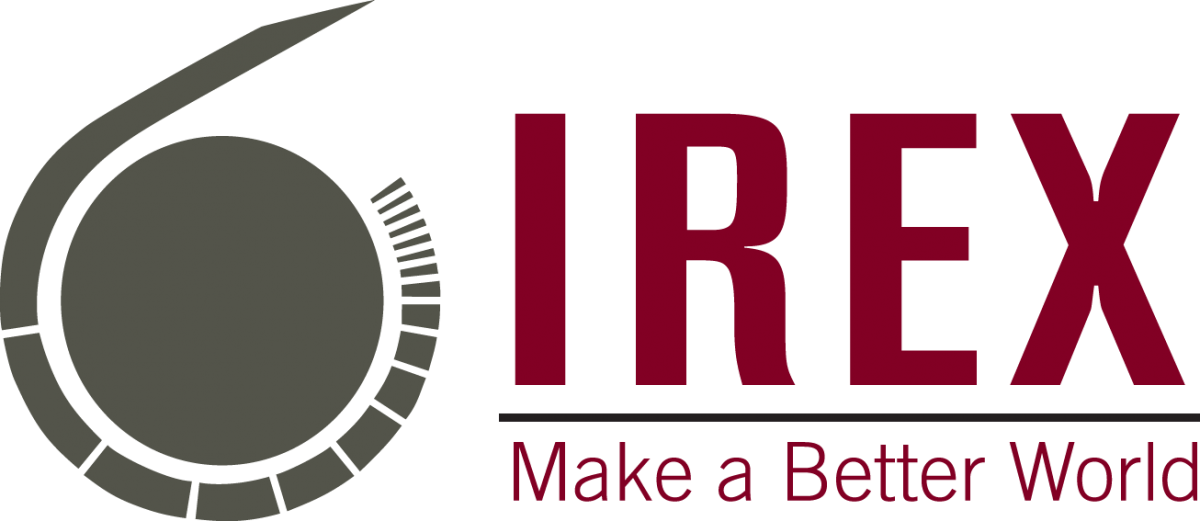 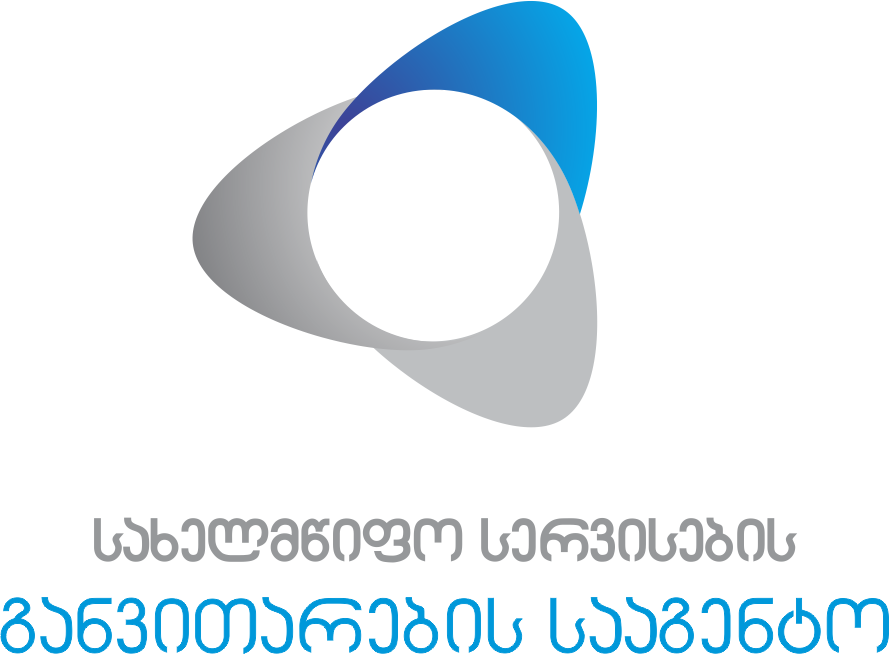  .jpg)
Background information
The IREX-sponsored Beyond Access program works around the globe to support the role of libraries in development efforts. Over 230,000 public libraries are in developing countries, including about 500 in Georgia. Their historic role as information hubs makes public libraries ideal sustainable partners to support Georgia’s development goals in improving public health, education, agriculture, and civic engagement. The government can do this by investing in librarians and demonstrating the value of public access to ICTs.
As part of its development goals, the Georgian Government has committed to ensuring the entire population has access to its services. In support of this goal, the Ministry of Justice’s Public Services Development Agency (PSDA) has identified 17 public services to be delivered online. The majority of the rural population of Georgia, however, has little to no access to these services. To bridge this gap, Beyond Access and its partners are implementing the GPS Lib project, which aims to pilot a model where libraries help deliver public services and provide access to information to rural populations.
Project goals
- Provide equal access to information and public services through community spaces
- Develop economic opportunity at all levels
- Bring citizens' voices online and connect them to government resources
GPSLib Fast Facts
- Partners: Public Services Development Agency (PSDA), Georgian Libraries Association (GLA), Institute for Development of Freedom of Information (IDFI)
- Working with 4 libraries to reach a total of 20-30,000 Georgians
- Developing new services in libraries around access to information and government resources
Modernizing Libraries
The initial phase of the project will focus on four libraries in two villages and two municipalities. All four libraries will reopen with more “modern” looks and be equipped with new computer workstations and WiFi throughout. The modern libraries will feature open, welcoming environments, meeting rooms, and multiple Internet access points. This will allow libraries to serve the current needs of the population and become Community Engagement Spaces — places where residents can come together with local businesses, NGOs, or government officials to address community needs.
Training Librarians
The modern libraries in Zugdidi, Khulo, Khidistavi, and Nukriani will require “modern” librarians – that is to say, librarians who are not only familiar with all the services of the new libraries, but can also assist library visitors in using these services to their best benefit. The GPS Lib project will deliver three phases of trainings to project participants. The first phase will focus primarily on basic IT skills and how to teach these skills to others. The second phase will focus on delivering new services, including e-Government. The final phase will focus on access to information and project planning and implementation, giving participants the tools needed to develop and execute programs beneficial to their community. These trainings will include librarians from the four partner libraries, as well as librarians from nearby libraries, local community organizations, and municipal offices, to ensure that all sectors can appreciate the benefits.
Connecting Citizens to Public Services
Through partnerships with the PSDA and private companies, the four participant libraries will help their patrons access e-government services, mobile companies, financial information, and a host of other beneficial resources related to citizenship and migration, social assistance programs, and social-legal certifications. The libraries in Nukriani and Khidistavi will house the same 17 e-Government services offered by PSDA. In addition to being able to train patrons on different 21st century skills, the librarians involved in the GPS Lib project will also work with them to identify information needs and direct them to the appropriate resources.
/public/upload/pdf/Memorandum-Of-Understanding-IDFI-IREX-PSDA-GLA.pdf
Grant agreement
|
Project goals are 1) to provide equal access to information and public services through community spaces; 2) develop economic opportunity at all levels; and 3) to bring citizens' voices online and connect them to government resources.
View more →
|
| Enhancing E-Skills of Controlling Government among Young People |
U.S. Embassy in Georgia |
2014-2015 |
$19,330 |
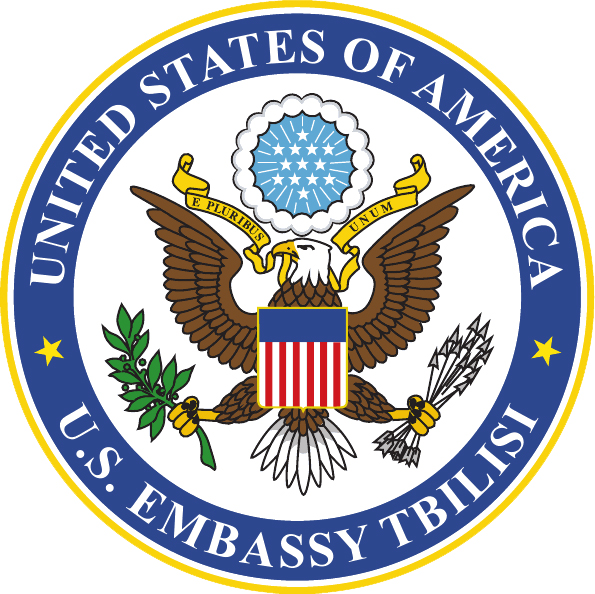
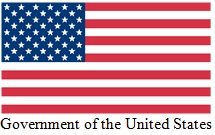
Project Title: Enhancing E-Skills of Controlling Government among Young People
Project Funded: U.S. Embassy in Georgia
Project Budget: 19 330 USD
Project Duration: August 1, 2014 – March 30, 2015
Brief description of the project
The project “Enhancing E-Skills of Controlling Government among Young People” strives to further develop critical thinking of youth. In particular, project aims to raise awareness among the students, young activists and civil society representatives about contemporary mechanisms how to hold government accountable and build up direct contact with decision-makers as well as enhance their practical skills in these directions.
In order to achieve the mentioned goal, project team plans to organize trainings for young people (in Tbilisi) and discussions for wider society of ten regions of Georgia and equip them with all necessary tools for achieving higher accountability of public institutions and their openness towards suggestions and feedback provided by citizens.
Trainings will cover the following issues:
- Electronic request of public information;
- Methodology of monitoring of governmental activities by checking effective functioning of electronic tools of public institutions (social networks, websites, e-mail, discussion forums developed on e-resources of public institutions etc.);
- Usage of open sources for controlling government.
Trainers will use both formal and informal methods during trainings.
Apart from educational activities, project enables participants to use newly gained knowledge practically, conduct their own monitoring with the permanent consultation of IDFI staff and prepare analytical articles on the basis of the main findings of the monitoring.
In order to expand outreach and impact of the project, IDFI aims to organize discussions in 10 regions about monitoring of electronic resources of public institutions. These regions include: Akhaltsikhe, Batumi, Gori, Zugdidi, Telavi, Marneuli, Ozurgeti, Rustavi, Sagarejo, Kutaisi. Centers for civic engagement will be utilized for these meetings. The problems related to interaction between government and civil society representatives will be raised during these events. Representatives of media, civil society and public institutions will be invited to these discussions.
Result of the project will be evaluated and the authors of the best articles will be rewarded during the final presentation of the project.
Project Timeline

Project Budget

Grant agreement
|
Project aims to raise awareness among the students, young activists and civil society representatives about contemporary mechanisms how to hold government accountable and build up direct contact with decision-makers as well as enhance their practical skills in these directions.
View more →
|
| Supporting and Monitoring of the Transition to Digital Terrestrial Broadcasting in Georgia |
Open Society - Georgia Foundation |
2014-2015 |
$60,645.04 |

Project Title: Supporting and Monitoring of the Transition to Digital Terrestrial Broadcasting in Georgia
Project Funded: Open Society - Georgia Foundation-OSGF
Project Budget: 60 645,04 USD
Project Duration: April, 2014 – December 2014
Project Description
During 2013, with the active participation and engagement of IDFI, important activities were carried out in terms of digital terrestrial broadcasting; however, despite such positive changes problems connected to de-monopolization, transparency of access tariffs, considering the interests of the regional media, introducing the competitive and open competition procedures still remain. State Strategy of Georgia, approved by the Government of Georgia in February 2014 reflects the proposals, recommendations and remarks of our organization; however, minor problems still remain on the stage of defining the strategic objectives.
Advocacy stage has crucial importance; other than making number of decisions regarding the activities directed at the end user (awareness raising), very important legal package must be prepared which will dramatically change the technical and legal basis of the media environment. Special attention must be paid to the process of selecting the digital terrestrial broadcasting platform operator, conducted by the Georgian National Communications Commission.
It is preferable to control the issues connected to the access to terrestrial signal networks of the national, local and regional broadcasters in order to eliminate the so called systematic and unsystematic obstacles. The role of the Georgian National Communications Commission is crucially important in these processes, which according to the government plan, must commence in 2014. Formation of the fully competitive market is likely to be completed by 2017 by creating number of alternative networks; in order to ensure the competitive media environment, it is important to control the digital terrestrial broadcasting network access tariffs, transparency and non-discrimination of the conditions of access, as well as focusing on the broadcasting tariffs which will be cost-oriented and reasonable.
Project Objectives:
During the next 7 months, in terms of monitoring the process of digital switchover, project will cover the following key directions:
- Implementing the process of digital switchover in accordance to the directives of EU, Georgian media market operators and European Court of Justice, identifying flaws and defining the ways of eliminating these defects.
- Eliminating the technical, competitive, economic barriers of the process of digital switchover.
- Monitoring the work of the LEPL Digital Broadcasting Agency, studying the current practice and the legal acts that were designed to regulated the process, elaborating the recommendations and advocacy; submitting the proposal of legislative amendments to the Parliament of Georgia and the Ministry of Economy and Sustainable Development of Georgia.
Project Activities:
In order to improve the Georgian media environment, activities must be carried out in the following four directions:
- Monitoring and advocating the process of digital terrestrial switchover and promoting through recommendations and highly professional researches.
- Monitoring and promoting the process of awareness raising among the population; evaluating, elaborating the recommendations and studying the effectiveness of public awareness raising implementation process.
- Studying, evaluating, elaborating recommendations, promoting the implementation and advocating the activities related to the digital terrestrial switchover.
- Monitoring the activities of the Ministry of Economy and Sustainable Development, LEPL Digital Broadcasting Agency, Georgian National Communications Commission, “Georgian Teleradio Center” LTD, and LEPL Georgian Public Broadcaster, connected to the process of digital switchover. Studying their practice and legislative acts, monitoring, submitting the recommendations and advocating.
- Monitoring, elaborating the recommendations and advocating the implementation of the activities of 2014-2015 of Georgian Public Broadcaster related to the process of digital switchover.
Grant agreement
|
The project will cover the following key directions: 1) implementing the process of digital switchover in accordance to the directives of EU, Georgian media market operators and European Court of Justice, identifying flaws and defining the ways of eliminating these defects; and 2) eliminating the technical, competitive, economic barriers of the process of digital switchover.
View more →
|

























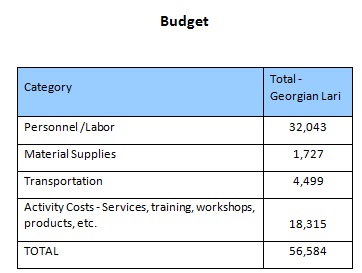




.jpg)



.bmp)





.jpg)


